#or write the characters similarly to how they appear in the source material
Note
well now I'm curious about your petty fanwork pedantries.
my pedantries mostly stem from my approach to fanwork, which is to be as accurate to the source material as possible. if not in form, then at least in spirit.
for example, i can't read most spider-man fics because the characters swear. the characters don't swear in the source material so when they swear in a fic it just pulls me out immediately (unless it's executed especially well-- traincat's tales from the back pages has a good "no fucking way").
my pedantic tendencies really flare up with it comes to homestuck. in the wake of the epilogues and post-canon, there's this sense among fans that canon is something to be ignored, and that you should just do your own thing. it clashes with my approach to fanwork. it doesn't help that the way i engage with any story i enjoy is to learn everything i can about it (a side effect from reading cape books , i suppose).
it also doesn't help that homestuck's many, many internal rules provide an excellent framework for making fanfic! like, i've seen a lot of people disregard the rules of sburb to just make stuff up, and i can't understand it because for me it's so much more fun-- and challenging-- to try and make an idea work within the framework. a lot of the creative challenge is making it work within the context of the story.
and with a work as long and winding as homestuck, the parts i like could be totally different than the parts someone else likes. so someone might make a fanwork that totally misunderstands the appeal of the source material (from my perspective).
like the homestuck epilogues strip away the breezy tone of the original, and dial up the angst. or something like godfeels, which is a well-recieved fic that i just can't get into for similar reasons. i have no interest in reading a fic that boils down to "what if the homestuck characters were adults and also they were fucked up"
it could even be something minor, like someone's conception of a character straying too far from canon. the other day, i saw a drawing of jade harley dressed like an emo. and i know it was just supposed to be cheesecake art basically-- like look at this cute drawing of a girl in emo clothes. but i just ended up being angry because i know jade harley would never dress like an emo! it doesn't make sense! it doesn't work! argh!!!!!!!!!
i want to make it clear that this is my problem, and not the fault of anyone actually making fanwork. i know it's so stupid and pedantic and neurotic and so i try to keep my mouth shut, because i know people are just having fun, and it's not a big deal. somehow, i can only get mad at trivial things that don't matter.
#questioning#homestuck#spider-man#like if you are not going to do anything interesting with the ideas/themes from the source material#or write the characters similarly to how they appear in the source material#then what are we even doing?
20 notes
·
View notes
Text
TYO Essay
A while back, I mentioned I wrote an essay for my previous uni course where I used TYO as a source to look at the early 1980s. @a-a-a-anon expressed an interest in reading it, so here ya go! The quality of it is seriously iffy (I was 18/19 when I wrote it and had no idea how to actually write or reference academic essays yet, and just the quality of the writing makes me cringe a bit). There was also more I wanted to say but couldn't due to the word limit (don't remember what these other things were now). Despite all that, the lecturer liked it, and it was cool I got to write about TYO for uni.
The Young Ones as a Cultural Source for Early 1980s Britain
Although today in Britain the future often feels uncertain – the global pandemic notwithstanding, Brexit is still looming on the horizon – the Britons of 40 years ago doubtlessly felt similarly, albeit for different reasons. In the early 1980s, the threat of nuclear war was palpable, as the existence of Protect and Survive[1] attests to. Nuclear war paranoia influenced British culture in the 1980s, with bleak examples such as the BBC film Threads (1984) and Raymond Briggs’ When the Wind Blows (1986) still remembered keenly today. Both fictionalisations of nuclear war featured material from Protect and Survive and highlighted the message of contemporary nuclear disarmament protestors: no one can win a nuclear war. Of the less apocalyptic issues, unemployment hit 3 million (about 11.7%[2]) in 1983 – for comparison, in 2019 it was estimated to be at 1.281 million (about 3.6%[3]). The Thatcher administrations’ efforts to break from the post-war consensus and embrace neo-liberalism created divisions in society. Yet, amidst threats of nuclear war, mass unemployment, the decline of British industry and the growth of individualism, a cultural revolution in comedy dubbed “alternative comedy” was fast taking hold in Britain – and in much the same way Thatcherism’s impacts can still be felt on society today, so too can alternative comedy’s.
Running for 2 series (12 episodes in total) on BBC2 between 1982-84, anarchic and slightly surreal sitcom The Young Ones epitomised the break between older styles of comedy and the new wave. Although The Young Ones has been called ground-breaking and classic, it is also now regarded as somewhat dated for its jokes pertaining to current events. Therefore, its scripts are an interesting source for an insight into the time in which it was produced and based: early 1980s Britain.
Firstly, it is important to understand what The Young Ones actually was. Written by Ben Elton, Rik Mayall and Lise Mayer[4] and with additional material provided by Alexei Sayle, it followed the misadventures of four vastly different university students at the fictional Scumbag College in North London. Whilst the four were never seen doing anything remotely akin to studying, it aimed at being representative of university life, students and the squalor they lived in. The show was not a conventional sitcom in that it did not pertain to a family and it featured a musical act in every episode so that it could be classified as “light entertainment”, as the BBC had no further budget available for sitcoms at the time. Because many of its principal actors came from the stand-up comedy circuit, there was an emphasis on excitement and unpredictability over discernible plots and many memorable scenes featured characters injuring themselves and others, destroying bits of the set and crashing through walls, as well as randomly interspersed and unrelated cutaway gag segments. There was a cartoonish level of slapstick violence, swearing and toilet humour, which appear milder to today’s palate than 40 years ago.
British audiences were divided by The Young Ones mostly along age lines, with younger viewers engaging readily with this new style of comedy and older viewers seeing it as unnecessarily vulgar and silly. Indeed, the characters that had been transplanted from their actors’ stand-up routines were deliberately disgusting, exaggerated caricatures and horrible to one another. Mayall himself played wannabe lefty anarchist Rick, who frequently came to rather explosive blows with the violent punk medical student, Vyvyan (played by Mayall’s comedy partner, Adrian Edmondson). Also featured was badly done to, depressed hippie Neil (played by Nigel Planer) and the mysterious leader and straight man of the group, Mike The Cool Person (played by Christopher Ryan, the only one of the core cast without a comedy background). Sayle too appeared in every episode as either their hated landlord Balowski or a member of his family, where he would deliver a short stand-up monologue to the camera. The show’s title (and opening theme) was derived from the Cliff Richard song of the same name, as Mayall’s character was a huge fan.
The Young Ones took on the issues of its day, perhaps none more so than the episode “Bomb”. “Bomb” uses dark humour to address fears over nuclear war by having an atom bomb land in the characters’ kitchen at the start of the episode. Even before the characters deal with the unexploded bomb, the script is already hinting at the theme of nuclear war in this cutaway gag sequence, featuring a family on a packet of cereal:
FATHER: Would you two shut up and keep smiling? We’re supposed to be the ideal nuclear family!
GIRL: Post-nuclear, more like!
Not only was this segment ridiculing the “ideal nuclear family” that was promoted by the Thatcher governments – none of the characters posing as a family get along at all and the “father” reveals himself to be gay, thus exposing the lie that there is truly an “ideal” family – it also managed to slip in a quick gag about nuclear war. This reflected a genuine belief by many at the time that nuclear war was coming, especially amongst the young.[5]
When the main characters finally become aware of the bomb in their kitchen, the script offers this response:
NEIL: I’m going upstairs to get the incredibly helpful and informative “Protect and Survive” manual! Nobody better touch this while I’m gone!
This reference to the Protect and Survive manual, which at the time and retrospectively has been regarded as useless in the event of an actual nuclear attack, appears for the purpose of ridiculing it. Having the character of Neil act as though the manual could help deal with something as serious as an atom bomb in the kitchen employs sarcasm as a critical tool. Protect and Survive featured suggestions such as painting the windows of the house white in order to deflect the heat from a blast, which The Young Ones also satirised:
RICK: Neil, can you lend me five- What are you doing?
[NEIL is reading his survival manual while painting himself white with a paintbrush]
NEIL: Oh, painting myself white to deflect the blast.
RICK: That’s great, isn’t it? Racial discrimination, even in death! What are these? [indicates a few lunchbags on the table]
NEIL: Sandbags!
The misinterpretation of the manual’s instructions, as well as the substitution of items deemed vital for items found in the house, reflects the feeling that most British households were simply unprepared for a nuclear attack and stood very little chance of survival. This is compounded later in the episode, when the four main characters resort to hiding underneath the kitchen table as a means of escaping the blast of the bomb – something many had resorted to in air raids during WWII but which was drastically inadequate protection against an atom bomb. This episode also portrayed the nihilism in British culture over nuclear war – a nihilism that can be found in other cultural sources, such as The Smiths song “Ask”[6] – through the character of Vyvyan, who spends much of the episode attempting to set the bomb off.
This show being the work of alternative comedians, The Young Ones also utilised its anarchic tone to critique the Thatcher administration of the time. This was usually done through the character of Rick, who blamed Margaret Thatcher for most problems faced by the group. Though his character existed to satirise upper-class closet conservatives as well as overzealous student activists, he was something of a mouthpiece for the left-wing writers. Some of his more memorable outbursts include:
RICK: We haven’t got any money! Vyvyan’s baby will be a pauper! Oliver Twist! Jeffrey Dickens! Back to Victorian values! [directly to camera, angrily] I hope you’re satisfied, Thatcher!
RICK: Neil! The bathroom’s free! Unlike the country under the Thatcherite junta!
Other characters were used to critique the government too:
RICK: School’s out forever! Yeah, come on everyone! Let all your hairs hang out! Do whatever you want!
MIKE: What’s all the excitement, Rick? Has education finally been cut altogether? That’s the only reason I voted Tory.
The first of these is a reference to the 1983 interview in which Thatcher endorsed a return to “Victorian values”. That is, a rolling back of the state to unburden the individual and set them free to prosper, should they put the effort in. This New Right attitude, combined with the high unemployment figures from that year, created the view that Thatcherism was about looking out for “number one”. This wasn’t aided by Employment Secretary Norman Tebbit’s “Get On Your Bike” speech at the Conservative Party Conference in 1981. The Young Ones captured the mood of particularly the youth in such a climate – one in which many felt misunderstood and patronised – in a cutaway segment featuring the fictional TV programme Nozin’ Aroun’:
BAZ: Rol! A lot of my mates say to me, “Oh Baz, what is the point?” What would you say to them?
ROLAND: Well surely, Baz, your mates must realise that there definitely is a point!
BAZ: So a real message of hope and good cheer there – from Roland, a really ace guy!
To summarise; just as is the case today, early 1980s Britons were facing uncertainty. This was especially the case for anyone working in manufacturing industries, as the unsuccess of the Miners’ Strike of 1984 signified a wider trend in British industry. The government’s overarching aim of turning society away from one in which a “nanny state” risked making people idle to one where everyone was free to accumulate wealth that would trickle down to the less well off was never going to be a smooth period to live through. The last tremors of the Cold War didn’t help make the period more bearable. Yet, it is often harder or uncertain times where laughter becomes more valuable to people and The Young Ones – though not to everyone’s political or cultural tastes – undeniably provided some release for younger generations. To call it an entirely accurate depiction of early 1980s Britain would be to forget that its primary purpose was amusement. Nevertheless, it does provide a colourful insight and one that is remembered with fondness by those who grew up watching it, even today.
[1] Protect and Survive was a series of government issued pamphlets, public information films and radio broadcasts produced in the late 1970s/early 1980s, to be distributed 72 hours before a nuclear attack was expected. Public interest meant they were released in 1980.
[2] https://countryeconomy.com/unemployment/uk?dr=1983-12, December 1983
[3] Office for National Statistics, December 2019
[4] All of whom are alumni of the University of Manchester.
[5] After speaking to some adults who were young during this period, Mr Smith revealed how (aged 11 in 1983) he told his class: “I want to be there when the bomb drops. I want to be right next to it so I’m disintegrated and don’t know anything about it.” Additionally, he was under the impression that a bomb would likely be dropped on Piccadilly Gardens, Manchester.
[6] “If it’s not love / Then it’s the bomb / Then it’s the bomb that will bring us together” – S. Morrissey & J. Marr, “Ask”, The World Won’t Listen, 1987
Bibliography:
Sources:
B. Elton, R. Mayall & L. Mayer, “Demolition”, The Young Ones, BBC2, 1982
B. Elton, R. Mayall & L. Mayer, “Bomb”, The Young Ones, BBC2, 1982
B. Elton, R. Mayall & L. Mayer, “Cash”, The Young Ones, BBC2, 1984
B. Elton, R. Mayall & L. Mayer, “Nasty”, The Young Ones, BBC2, 1984
B. Elton, R. Mayall & L. Mayer, “Summer Holiday”, The Young Ones, BBC2, 1984
Central Office of Information, Protect and Survive, Her Majesty’s Stationary Office, 1980 Transcript of Brian Walden interview with Margaret Thatcher for BBC, 1983: https://www.margaretthatcher.org/document/105087
16 notes
·
View notes
Text
“You can’t be careful on a skateboard”
Skateboarding is notoriously difficult to write about. Iain Borden flags this in the introduction to Richard Gilligan’s work on DIY skateparks, underlining how the visual medium works so much more effectively than the scribed word. Similarly Kyle Beachy crafts a magnetic novel on skateboarding in patiently describing the art while also painstakingly pushing away the cringe that so often creeps in to so many attempts to render the board in literature. Skateboarders are all too familiar with the quick spike of pleasure when a board appears in a film, TV show, or music video. This sudden excitement cools rapidly as we observe the way our precious toy is depicted. It is almost always wrong.
I was therefore taken by surprise at the treatment afforded a skateboard by Stephen King is his now iconic novel IT. Originally published in 1986 the year that Animal Chin was released, the book sits before the modern rise in skateboarding. The boom of vert and well in advance of the heady days of street skateboarding. Yet King taps into both the peculiar and the authentic. Over a few short pages that come just over midway through the hefty text, the central character Bill Denbrough encounters a young boy with a fibreglass board. Stood over the very drain where Bill lost his younger brother to the murderous clown from the id some 30 years prior.
During their brief exchange Bill asks if he can have a go on the young boy’s board.
“The kid looked at him gape-mouthed at first, then laughing. “That’d be funny” he said. “I never saw a grownup on a skateboard.”
This is the first reckoning with time. Back in 1986 adults on skateboards were an amusing rarity. Indeed that prejudice may well linger now. A skateboarding adult may be a source of amusement, but rare they are not. It would be difficult to imagine a 10 year old kid being so bemused by an adult skateboarder in 2022.
The next description is material, sensual, and emotional. Bill handles the board and inspects it before he attempts to ride it.
“He turned one of the skateboard’s scuffed wheels with his finger, liking the speedy ease with which it turned - it sounded like there was about a million ball-bearings in there. It was a good sound. It called up something very old in Bill’s chest. Some desire as warm as want, as lovely as love. he smiled.”
This description resonates. The pleasure in the sound and the way it conjures a feeling of warmth and love, strikes as authentic. Bill appears to be connecting not so much with the joy of skateboarding, but of the skateboard itself. He recognises it as some kind portal to freedom. Or as Lefebvre comments, children’s toys appear to be ‘cosmic’ objects demoted in status some way status.(Critique of Everyday Life Vol1.1991, p 118).
As Bill proceeds to stand on the skateboard he becomes fearful of the practicalities of falling. He imagines a doctor chiding him for attempting to use a skateboard at the age of forty. He imagines that the kid rides the board with no such fear, as an attempt to “beat the devil” like no tomorrow.
He surrenders the skateboard to the kid and gives up on his attempt to ride it. He tells the kid to be careful on the skateboard and gets a more powerful rebuke than the one in the imagined exchange with the doctor.
“Be careful on that,” Bill said.
“You can’t be careful on a skateboard,” the kid replied looking at Bill as if he might be the one with toys in the attic.”
“Right,” Bill said.
He then watches him push away down the hill. This is another evocative passage that I will only repeat in part. It does once again chime with the emotional experience of riding a skateboard and the longing for the freedom of youth.
“But he rode as Bill had suspected he would: with lazy hipshot grace. Bill felt love for the boy, and exhilaration, and a desire to be the boy, along with an almost suffocating fear. The boy rode as if there were no such things as death or getting older. The boy seemed somehow eternal and ineluctable in his khaki Boy Scout shorts and scuffed sneakers, his ankles sockless and quite dirty, his hair flying back behind him.”
The exchange with the skateboarder resolves when Bill stumbles across his old childhood bike ‘Silver’ in a second hand store. Something of the freedom and love expressed toward the skateboard translates to his childhood memories of recklessly speeding through town on this mammoth bike. The two elements of the chapter complement each other sweetly.
In the 2019 film adaptation of the book. IT Chapter 2 the scene is included and is stripped of all emotional content. The young skateboarder no longer has the old fibreglass board but a modern popsicle replete with subtle Overlook Hotel carpet graphics. In the film Bill has already found Silver before he encounters the boy and has his moment of rekindled youth riding the bike. Remarkably the film from 2019 gets it all wrong and the book from 1986 gets it right. To underline this fact, the skateboard kid in the film become a victim of Pennywise, the boy in the book survives.
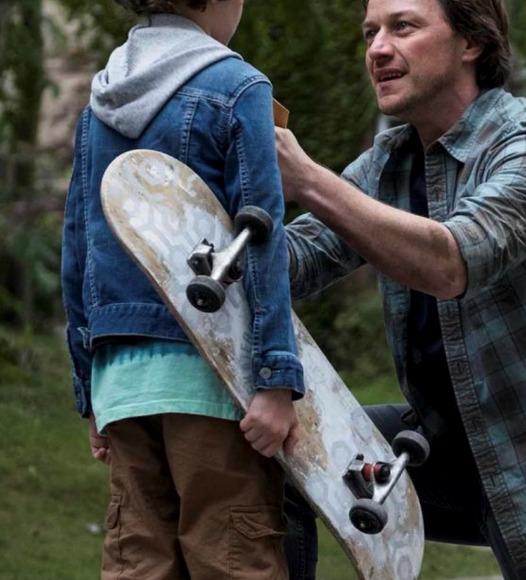

6 notes
·
View notes
Note
Hey, I just wanted to speak up about the way afab and amab are used as shorthand for kinds of bodies in a lot of the questions here. As a trans person, it makes me really uncomfortable seeing these terms used as a "woke" substitute for "female-bodied" or "male-bodied". The idea that the gender you were assigned at birth tells us what genitals you have is exactly what these words were created to get away from? You could be afab and have a penis (e.g. intersex). It just feels really transphobic.
I appreciate you sharing that! I hear you, that it makes you feel uncomfortable, and am glad you’re checked in enough with yourself that you can recognize that discomfort.
(For those who don’t know, those are shorthand for “assigned female at birth” and “assigned male at birth”. They aren’t an exact description of genitals; they are instead what doctors write on a birth certificate based on ultrasounds or appearance of genitals at birth)
I am going to keep using amab and afab in specific circumstances, but I will explain why, in case this is helpful:
To start, I don’t usually use that language! I prefer to say “person with a penis” / “person with a vagina” / person with a prostate / etc, as I care more about what a person’s genitals look like during the sex that they are having, and less about what’s written on their birth certificate (In ficsex context, specifically. Generally, I don’t care at all what someone’s genitals look like).
Sometimes people in the asks use that language.
A lot of those people are non-binary humans for whom that language correctly describes enough of their experience to ask me a question. I’m not ever going to tell askers what language to use for themselves. They might choose to tell me that they are “cis women” or “trans women” or “trans men” (etc.) and that would also give me some clear info about their circumstances, but that language doesn’t work for everyone. Saying “Mx. Ficsex, I’m AFAB and I’m experiencing this: ____” is telling me what they want me to know, and not telling me things they don’t want me to know.
(I think this is mostly what you’re referring to, but I’ll go on a bit more to be clear with readers).
I don’t think afab and amab are are a "woke" substitute for "female-bodied" or "male-bodied". They are genuinely useful phrases that explain a) what genitals a person most predominantly displayed, at least at birth and possibly now, and b) what kinds of social forces they’ve dealt with.
On this blog (and in real life), I would never say "female-bodied" or "male-bodied". I know men with vulvas - I wouldn’t say any of them is “female-bodied”. I know women with penises - I wouldn’t say any of them is “male-bodied”. One of them might say she is ‘assigned male at birth’, though, as that is helpful information when it comes to learning about how she navigates the world, how the world responds to her, and - yes - what kinds of genitals she is likely to have, medical transitioning aside.
Definitely, none of these are guarantees. I try really hard to be specific when I am talking about trans bodies that have undergone any kind of medical transition, and if / when I talk about intersex bodies, I’ll specify that also! If you read my blog, you probably know by now that I am an over-explainer and a very precise person. I like specificity!
I read a lot of blogs by trans folks, binary and non-binary, and I check in with my trans colleagues frequently. I update my language and my teaching materials as often as I need to. As a non-trans person, it’s important to me to use the most affirming language that I can, and so I mirror the language used by these professionals and community members that I follow. These sources are still using amab and afab to describe exactly what they are saying - what sex a person is assigned at birth, and all of the baggage that comes along with that.
This is not to say that your discomfort isn’t valid - I can see that it is! Reaching out to a blog can be scary and tough! But it is to say that there is literally no language that makes every single person comfortable and safe, and all I can do is my best. At this moment, I feel like the language that I use in this blog still follows the guidelines and preferences that I see in the blogs / books / guides that I read. It also is to say that I’m not going to police the language that people who submit questions choose to use.
If you submit questions and you have been using language like “amab” and “afab” to describe your own body or the bodies of your characters, please feel encouraged to see if there are other words that will similarly describe what you are trying to communicate. That’s a great move. But also, keep using the words that you identify with, and that is okay.
58 notes
·
View notes
Note
How do you feel about a neurotypical person playing the role of Spencer Reid though? Personally I do like Matthew Gray Gubler in that role but I think he was hired for his appearance rather than for something else. I would have liked to see a real autistic person in that role.
Spencer Reid isn’t canonically autistic, though. The character was pitched as a 40-something male, intelligent, a ‘walking dictionary’ akin to Data from Star Trek (referenced by the original SAGAFTRA casting call, and Gubler himself). The character may have been altered or defined to better suit the actor selected, to create a more dynamic ensemble, to fulfil CBS’ terms as the pilot moved to series, or as a natural progression as the character grew over 15 years. But it is clear no autistic role was ever in development. Even when we consider what ‘Spencer Reid’ the character would become as the series progressed, the casting call that was released did not specify he was/could have ASD. For that reason the actor who auditioned is not at fault here. Furthermore, Intelligence and social awkwardness are not always an indicator of ASD, and I would argue they are not in Spencer Reid. Here’s why.
Disclaimer: the essay that follows contains my own views and opinions on Spencer Reid, in reference to a possible ASD diagnosis. This is what anon asked for — my thoughts, as someone with ASD. Opinions are supported by examples from the source material. Some members of the fandom may see things a different way, or disagree with what I am arguing, but I am no longer replying to messages or comments related to this. Accept we have a different viewpoint and move on, thank you.
Many of Spencer Reid’s perceived ‘stereotypical’ autistic traits — intelligence, inability to regulate emotions, awkwardness, isolation/pariahdom — could be a result of his childhood and past experiences. The small glimpses we have seen into Spencer’s life prior to 2005 may provide some insight.
Canonically, Spencer had no suitable parental figure from age 10. After his father left, he was alone with a mentally ill mother. In 12x11, we see Diana physically assault Spencer when she becomes enrages. When he lies and tells her the marks are a result of him bumping into something, her comments about him being such a clumsy child she called him ‘crash’ may indicate the abuse was longstanding and repeatedly covered up by Spencer in the same manner. Perhaps in fear he would lose a second parent. Although Diana’s abuse may not have always been physical, from 2x16 we understand her illness made it hard for her to get our of bed, and remember what day of the week it was. We can therefore infer she was incapable of ensuring Spencer was well taken care of. Cooking, cleaning, caring for him when he was sick, or dealing with his school bullies would have been out of the question.
By 3x16, it is clear Spencer’s young life was defined by abuse. Whether that be wilful neglect from his father, as a result of his mother’s illness, or at the hand of his peer group. The incident involving the goal post Spencer speaks about in this episode, and the similar experience from 8x12, are both examples of sexual abuse. There is no acceptable argument against this. We can infer that if the teenagers that assaulted Spencer did this without apparent consequence, the rest of Spencer’s high school life must have been a nightmare. The trauma and isolation Spencer experienced during this period could most definitely have resulted in an inability to connect with others. Friendships and romantic relationships are based on trust and vulnerability, Spencer has learned not to give anyone that power over him. As Spencer himself said in 1x10 “I confided in you. This is exactly what happens when I trust someone, it gets thrown back in my face.”
Another trait Spencer is said to exhibits that many use as confirmation of his ASD, is his apparent inability to pick up on social and behavioural cues. I would argue this is false. Spencer is a profiler. He has been seen outwitting and outsmarting many unsubs by picking up on things like vocal changes, eye contact and mannerisms, anticipating a reaction and using it to his advantage. He was able to detect JJ was pregnant far before anyone else, and that Emily picked her nails when stressed. Not knowing what Twilight is, or about the K-I-S-S-I-N-G song, is not representative of missing social cues. Spencer is known to not read “much in English”, to not have email, to have no friends outside of work to talk about pop-culture with, and to be a technophobe. It may also be argued that Spencer’s ability to connect with the unsub or how well he profiles their behaviour, varies depending on who is writing the episode and what story they want to tell that week. Similarly, in 6x20, Spencer reveals during childhood therapy sessions, he was able to read the situation and respond accordingly in away that satisfied the adult professional. This is not typical for an autistic child. Again, this is based on a stereotype, but so is the fandoms understanding of Spencer and his apparent ASD to begin with.
TLDR: So, in conclusion I wouldn’t say the casting is problematic at all. The character has never been canonically autistic and any perceived ‘autistic traits’ the fandom sees, have been indicated long after the series had commenced. As someone with ASD, I would be wary to label Spencer Reid ‘autistic’ based on how well he fits the ‘Sheldon Cooper’ stereotype, when his behaviour and personality can be seen as a result of his environment and experiences. I think giving the ‘autistic’ label can be dangerous in these instances (ignoring the fact Spencer is a fictional character), as it offers an ‘explanation’ for behaviour and an excuse for those around the person to be idle. I mean this, in the sense that someone like Spencer who has experienced neglect and sexual abuse as a child, and who has difficulty connecting with and trusting those around him because of those experiences, needs help to deal with those feelings. Rather than to be less ‘autistic’.
As a final note, I would also like to say I would never speculate on a real persons status as ‘neurotypical’ or otherwise. Unless explicitly stated themselves. Things like OCD, ADHD and Dyspraxia are harder to detect in adults, especially ones we know from a few interviews. I think in this instance a non-autistic actor plays Spencer Reid, but it’s not my place to offer anything else.
#Spencer Reid#Matthew gray gubler#ASD#autism#aspergers#actually austistic#ask#criminal minds#studyblr#personal essay
61 notes
·
View notes
Photo
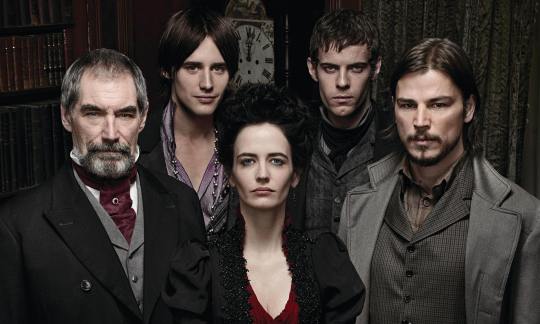
TV | Penny Dreadful (2014-2016)
This review has sat in my drafts for over a year. (It’s been a weird year, don’t judge me). Although I had a few notes sufficient enough to write a review from and could have probably have finished and posted something by now, I will honestly say that I have pondered Penny Dreadful this entire period of time. Even as I watch other series and take part in other media, every so often my mind wanders back to Penny Dreadful. Whether the show intrigued me or irked me has not entirely been decided, to the point where I am almost feel hastened to watch the show again with more attentiveness. But, just as I feel about Marvel’s Iron Fist series, I’m not sure I want to endure some of the more vexing qualities of Penny Dreadful a second time around (though I sadly will for Iron Fist as I once again attempt to complete the entire Defenders collection).
Let’s see what I can make of my long-stored memories.
Penny Dreadful derives its name from what is essentially Victorian England’s version of a comic book, typically with narratives of crime or violence. As per Britannica, these eight-page installments – also called “dime novels” or “bloods” – were carelessly written second-rate works full of gory themes. While I wouldn’t say the series to be careless or second-rate, it definitely hits the crime, violence, and horror right on the nose to give its namesake proper honor.
Set in the late 1800s, Penny Dreadful bears resemblance to The League of Extraordinary Gentlemen in that it includes characters from various works of classic literature, though Penny Dreadful sticks to the obvious era of Victorian Gothic. Although its main characters Sir Malcolm Murray (Timothy Dalton), Vanessa Ives (Eva Green), and Ethan Chandler (Josh Hartnett) were created for the show, its supporting cast are directly named after major literary characters – Dorian Gray (Reeve Carney), Dr. Victor Frankenstein (Harry Treadaway) and his Creature (Rory Kinnear), as well as brief appearances throughout by Mina Harker, Abraham Van Helsing, Dr. Henry Jekyll (sadly, while the science is included, Jekyll’s own counterpart Hyde was not), Dracula, and Justine (from The Misfortunes of Virtue). It has been discussed online that the character of Malcolm is based on famed adventurer Allan Quartermain from King Solomon’s Mines and, by name, obviously a derivative of Mina Murray’s father from Dracula; however, he was not mentioned in the novel. Similarly, Vanessa Ives is said to be based on Mina’s best friend Lucy Westenra. Furthermore, the story arc of Brona, who then becomes “Lily Frankenstein,” shares obvious similarities to that of the Bride of Frankenstein.
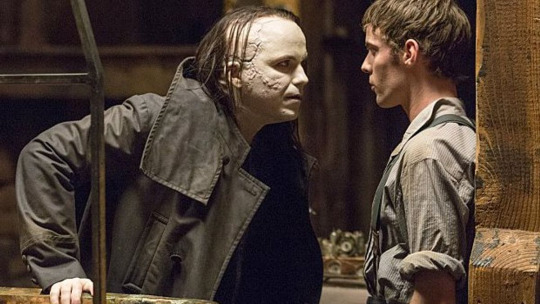
The rich inspiration from classic literature is what initially drew me to watch Penny Dreadful, along with the hype I read when it was initially released in 2014. Despite the fact that I am typically not one for horror-based film or television, I undertook the task regardless. Per my usual reasoning (I swear I write this in everything and I apologize lol), I wanted to discover for myself if it was truly as great as the critics say. And dare I say, it was actually true for the first season. I remember posting something on Instagram stating how I understood the public interest in the show and that I was excited to continue on. While it has no doubt been some time since I’ve viewed the material, I distinctly remember my personal fascination dwindle shortly thereafter. Had I any sort of ability to abandon the media I try to consume, it might have caused me to not finish the show. But alas, I’m one of those hopefuls that thinks maybe it will get better. Plus, can you really say you watched something if you didn’t watch the entire thing? My answer: no. Must watch it all to have a proper opinion!
Wherein the first season focuses primarily on finding a kidnapped Mina Murray, with tolerable amounts of arc for Frankenstein, his creature, the mysterious Ethan Chandler, and Dorian Gray... the latter seasons revolving around witches and “nightcomers” (season two), and Dracula (season three) – as well as the constant battles between Frankenstein’s scientist vs. his creations, the dragged out uncovering of Ethan’s background, and Dorian’s inability to keep it in his pants – just didn’t seem to have the same charm to me as the initial season. Maybe it was the story? Were these the best “big bads” writers could come up with? I suppose, yes, considering the source material of that particular period, there’s only so much to work with. But to have the first season’s enemy be simply a vampire and the third season’s Dracula, it seems to me like missed opportunity (like using Dracula in his actual storyline) or they were really just recycling material. You used vampires once already; was doing it again with one buffer season in between really your only option?
Other nagging details that truthfully somewhat prevent me from watching the series again include things like: how much of Vanessa’s “dialogue” actually includes Eva Green’s ability to make guttural sounds; how certain arcs overwhelmed the series (like Frankenstein’s Creature and Lily, though kudos to Penny Dreadful for exploring their thoughts/feelings that other films or shows have not), compared to others tales that were not fleshed out enough; characters from literature left me wanting more, even if I did already know their mythos (Dorian, for example, was merely only a brief glimpse at his portrait, no explanation of its mysticism); and lastly, Lily’s entire story felt too much for me. While I admire the show’s portrayal of feminism, body autonomy, and a sense of sisterhood amongst Lily and her “army,” her approach to these topics also felt preachy and eventually fell more into a “savior” complex. I can understand the rediscovery of life as a newly reanimated human, re-comprehending life and death, not allowing any man to “own” her purely based on his say-so... but the way the show writers approached it was not my favorite. Billie Piper was great in her role, but towards the end of her arc, I was bored with Lily’s endeavors.
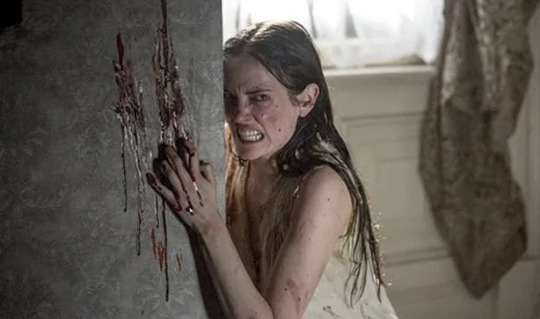
My biggest pet peeve surrounding this show, however, was actual a very random detail – Ethan and Brona (Lily, in her previous life) had a very intense relationship during the first season before she succumbs to illness. How is it, despite both of their prominence in the show and their respective arcs, as well as mutual acquaintances with other characters, that Ethan never ever crossed paths with Lily at all once she was reborn? Was it because he would obviously recognize her as Brona and writers didn’t know how to incorporate that detail into the show? Was it because they wanted Lily to remain purely a character in Frankenstein’s and Dorian’s arcs? Someone please answer this for me, because it drives me nuts.
All in all, Penny Dreadful started strong and I did enjoy it at first, but its subsequent seasons and finale felt less than spectacular. What was once an enjoyable suspenseful thriller turned into a psychological drama looking to interpret everyone’s personal issues and traumas rather than working together for a common, supernatural cause. Where the first season saw everyone as a collective group, I feel the show slowly but surely lost its charm by increasing their solo arcs without much interaction amongst everyone as a whole. It’s not to say that they never spoke to one another (Ethan and Lily being the exception), but their interactivity became increasingly minimal. I will give writers some credit in that, for some characters, this solitude reflected their emotions and was necessary for their arc. But maybe I just believe the show was better when the ensemble was a more cohesive whole.
#tv#television#tv show#television show#penny dreadful#eva green#josh hartnett#vanessa ives#ethan chandler#dracula#dorian gray#frankenstein#bride of frankenstein
5 notes
·
View notes
Photo
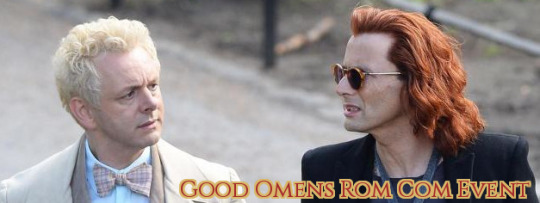

GO Rom Com Spotlight: @apocryphalia
The most excellent @apocryphalia (also apocryphalia on Twitter and AO3) has claimed Casanova to adapt for Good Omens in the Good Omens Rom Com Event.
For reference, here’s a little background about the source material.
About Casanova: With a reputation for seducing members of the opposite sex, Casanova discovers a beauty who seems impervious to his charms. However, as he continues to pursue the indifferent lady, he finds himself falling in love.
We spent some time chatting about how the adaptation is coming so far, as well as future plans for it! Now, get to know @apocryphalia a little better!
* * *
goromcom: So, you know how if you open a Tumblr chat with someone you haven't chatted to before, Tumblr tells you two things they post about? I wanted to tell you that yours reports that you post "about #aziraphale/crowley and #ineffable husbands." Well, you're a true blue fan, and I support that!
apocryphalia: Considering this blog exists because I’m 100% pure Good Omens trash, that’s not shocking. I’m also slightly obsessive about my tags, which is probably why my mother and that one career test I took in college insist that I should have been a librarian.
goromcom: Oh, librarian is one of my dream jobs, but I never pursued it. I also feel similarly about tags! But before I start waxing poetic about the Dewey Decimal System, let’s segue to your rom com.
You chose to adapt Casanova as your rom com. Has this story been a favorite of yours, or is there some other reason you chose it? Were you thinking specifically of the David Tennant adaptation of the story, or just Casanova in general?
apocryphalia: Like a lot of us, I may have gone a little bit crazy watching Tennant and Sheen's previous roles after the show came out, so I had seen his Casanova fairly recently, and I was definitely thinking of that version when I looked at the list. Also, this is a bit silly, but I have no idea how dates work, and I originally thought that the event claims opened the day after they actually did. I had off work the day I thought claims started, and I was planning to watch a bunch of movies I hadn't seen and put some real thought into which one I might want to do, but I figured out about two hours beforehand that I was very wrong. So I kind of panicked and just started throwing titles that I had already seen into the list, and I liked Casanova and couldn't resist the Tennant connection, so… here we are. No regrets.
goromcom: Sometimes life throws us the very curveball we need.
What's your favorite moment of Casanova, and are you looking forward to presenting it in your adaptation? Any loose plans for that scene that you can share?
apocryphalia: I love Bellino, and I love the scene where she breaks off her engagement with Casanova and plays wingman for him with Henriette instead. My main goal in planning this so far is basically just maximum gender fuckery, so I’m still trying to work out exactly what to do with the character—I’m going to have to play fast and loose with the actual historical status of castrati, which gives my historian-brain some anxiety—but I think it’ll be fun to write, and hopefully fun to read! (Also, fun fact, the actual historical Casanova may have been bisexual, so why shouldn't Crowley!Casanova try to marry a castrato and also fem!Aziraphale?)
goromcom: Why not, indeed? I can absolutely see that for both the historical Casanova and for Crowley/Aziraphale as well.
Other than a healthy sprinkling of gender fuckery (of which I’m very much a fan) do you plan to stick very closely to the beats of the original story, or make bigger changes?
apocryphalia: I’m planning to stick pretty closely to the events of the Tennant adaptation for the first half or so, but I’m changing the ending because obviously our ineffable spouses need a happy ending! I’m also ditching certain children that appear in the story, for the purposes of gender fuckery.
I would like to keep to the flashback format, as in the movie older Casanova is actually telling these stories about his life and his relationship with Henriette to another servant in the household where he’s now a librarian. So parts of the fic will be in first person as excerpts from Crowley’s memoirs, and others will be in third person telling the events as they actually occurred. I haven’t completely nailed down which POVs I want to use yet, but Crowley is certainly not a reliable narrator, and I think the back-and-forth timeline showing both young and old Casanova is interesting, so I’m going to try to keep that vibe in the fic.
goromcom: What's an interesting decision you've made in your planning so far--a notable casting decision, a changing of venue, or some other plan you have to paint Good Omens all over your rom com?
apocryphalia: Ineffable wives! Again, I’m going to have to play fast and loose with history and it’s giving me some anxiety, but this is fiction, it’s fanfiction, and it’s going to be fun, dammit! Fem!Casanova!Crowley may be slightly channeling Gentleman Jack, because who doesn’t love lesbian Suranne Jones? Aziraphale gets to be the cautious, repressed one desperately trying to adhere to societal expectations while also being desperately in love with her as Henriette, and there will be plenty of slow-burn, mutual-pining, dancing-around-their-feelings-and-their-crappy-circumstances goodness!
goromcom: I think fiction and art help us imagine the world we want, so if we want a world where people aren’t so hung up on gender or orientation, what better place to start than in our storytelling? <3
But I don’t want you to reveal too much about your story before it’s time to post it, so let’s move on to the final question, cribbed from The Good Place: The Podcast. Tell me something "good". It can be something big or small. It can be a charity you think is doing good work, or you can talk about how great your pet is.
apocryphalia: Well, I can’t resist an opportunity for pet pics. My cats are both terrible at being cats, and they are my favorite things in the whole world. Look at these little idiots being king and queen of recycling mountain! [ed: photo below interview]
Also, on a real note, there are other similar organizations all over that could use support, but here in my part of South Jersey, the SERV program at the Center for Family Services runs the domestic and sexual violence advocacy programs, and assists victims of human trafficking. I’m a former volunteer with them, and everyone involved in that work is so incredibly compassionate. They provide free counseling, support survivors through the medical exam and reporting process (or through the decision not to report), and they operate a 24-hour hotline and the domestic violence shelters for two counties. Their #1 goal is to believe and trust survivors, and to support whatever they decide is best for them, not to pressure them into any particular course of action (i.e., reporting an assault or filing for a restraining order) and I just think that’s incredibly powerful and helpful.
goromcom: SERV sounds like an important resource and I’m so glad the people of South Jersey have something like that to support them. (Though let’s hope as few people need it as possible.)
Make sure to watch for the GO adaptation of Casanova, coming soon. (And now here’s that pet photo I know everyone was waiting for.)
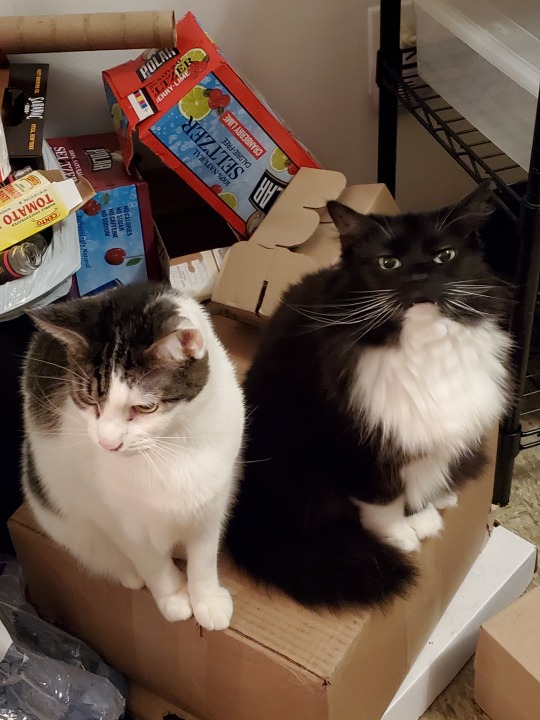
42 notes
·
View notes
Note
Finally, Crisis on Infinite Earths?
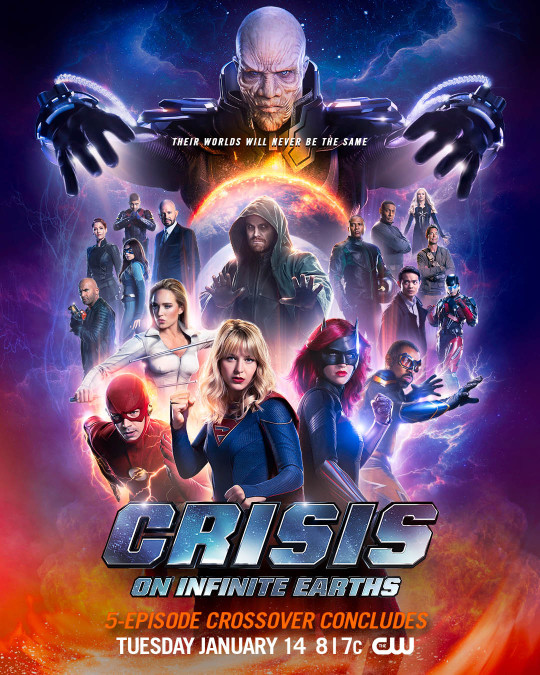
Let’s dispense with any pretense right up front: CW’s Crisis on Infinite Earths is thoroughly dopey, punishingly cheap, and unselfconciously corny in the most heavy-handed ways. It is also, similarly in the spirit of wanting to be direct, probably my favorite live-action DC thing other than The Dark Knight. It’s pure, uncut, unapologetic dork superhero joy injected right into the jugular, every single ambition that a primetime network television soap/procedural/mini-MCU homunculus adaptation of the biggest comic book event of all time could have ever conceivably achieved and far beyond. Not in question that I substantially prefer it to the source material, and it’s if nothing else worth regarding as the singular achievement that it is and will remain: when the movies get around to a Crisis someday, the shared ongoing TV/cinematic universe paradigm means there aren’t going to be fistfuls of actors from past interpretations to draw from the way this could for much longer. This was in all likelihood the one shot to do this in the way everyone wanted it to be done, and it held together.
Not that much in the way of deep analysis to offer, and I already discussed the first three episodes, so let’s just get into it:
* Malthus! Low on the totem pole of shock DCU minutia, but I was mighty pleased.
* Not nor have I ever been much of a shipper, but “Do you trust me?” “With every cell in my body.” is the gayest thing I have ever seen, my lord.
* Literally everything with Lex in here is solid shining gold.
* For all the elements I had assumed were givens that didn’t happen - not that I was bothered by much of it other than I really do wish Danny Trejo had been here - Ezra Miller putting his money where his mouth is was in my dang joke category of stuff that was obviously never going to happen. What an absolute delight, and moreover I had thought in the first place “This scene really feels deliberately structured such that it would fit as a scene in the Flash movie, especially given this is where this version has the idea for the name? But that seems so unlikely!” and then Guggenheim confirmed that the CEO of WB specifically asked for that scene to be included, so I guess the Flash movie is going to be a covert sequel/companion piece to the friggin’ CW Crisis! Even if Gustin’s possibly only in the one bit though, I do hope this means Tom Cavanaghhas at least a cameo.
* The killer dumb as hell line aside, Oliver vs. the Anti-Monitor was conspicuously the best special effect in the whole thing, they clearly blew a lot of the budget on that.
* Wolfman got to be the one to tell them the Earths had been merged! And kudos to him co-writing the Arrow episode, which was probably the best of the lot from a pure storytelling/dramatic standpoint; when I say this was leaps and bounds better than the original Crisis, that’s not a knock on him.
* BEEBO. And Sargon the Sorcerer! But BEEBO. Hopefully him appearing at the height of all this and being a thing the non-Legends have to deal with is a sign of the weirdness continuing to be upped across the board.
* The final plan to defeat the Anti-Monitor is the most beautiful Silver Age nonsense, to the point that I’m fine with the last battle basically being in a Vancouver back alley the way I’d said they’d written themselves out of being able to do a year ago. And while there’s an argument to be made that from an in-universe perspective it should have been Flash to deal the final blow given this has been built up on his show since day one, it feels right that Supergirl as his biggest classic casualty scored the win. Either way, the idea of a teeny-tiny Anti-Monitor bein’ all grumpy in the Microverse for all eternity is a delight. Apparently some complained that he was a boring stock villain in this, but folks, I got some bad news about what they’re drawing from.
* Heat Wave is living his best life and we should all be so blessed.
* Given his backseat role as essentially the most important of the non-central characters, all I was truly rooting for with Hoechlin’s Superman in terms of strutting his super-stuff was getting one good hit in against the Anti-Monitor, and then it turned out he was one of the only three (or four if you count Oliver) who did out of the 50+ or so superheroes in total here, so I was a happy camper. And itty-bitty Superman was funny right away, but even funnier when I realized that was basically making Hoechlin an Atom to go with Routh’s Superman. Can’t wait for the show.
* I assume that as I’ve seen others suggest Earth-12 is meant to be the HBO Green Lantern series and they simply used the related footage they had available, but that movie of all movies therefore getting a shout-out in here is both hysterical and somehow perfect: everything has its place.
* Routh lives, in what might be a brighter rewritten timeline! This could easily be his sendoff and it’d be a perfect one, but I’d of course be more than pleased for him to fill a Kal-L role in Superman & Lois.
* “The first of our heroes”? Did Green Arrow precede Superman, which would be a change in at least one of their timelines? Wasn’t Black Lightning a hero awhile back? Or is this just in the sense of him being the first public human hero? The real answer is that it’s an acknowledgment of his real-world role as the guy who kicked all this off and the logistics don’t matter.
* Justice League! Justice League! Justice League!
youtube
* Wonder what the next crossover’s going to be? Easy answers would be something with Superman in the lead now that he’ll be fully in the fold (I understand the 90s crossover Panic in the Sky! was meant for much the same purpose of positioning him as a leader in-universe), or a Dark Nights: Metal adaptation with Batwoman center stage, but the producers have been adamant that the next entry will be something smaller. Maybe a set of mini-crossovers of two or three shows in blocks, or a subplot building across multiple shows that culminates in one or two big episodes with the League banding together. I’d love for their first adventure as a formal team to be fighting Starro (he could emerge as a Lovecraftian threat ala how Morrison treated him in JLA, only for J’onn to link them up to his mind and he turns out to be the hilarious doofus bully from Metal, but the first big crossover was already an alien invasion that involved a bunch of superheroes being mind-controlled, so there is the concern that it could come off as redundant. I’m still in favor of it though, as it could get us a live-action Jarro.
So there we go, there was a live-action Crisis on Infinite Earths. Whereas its source was dopey junk food in service of tearing down a lot of cool stuff, this was dopey junk food in service of delivering and setting up more cool stuff to come, so I’ll stand by this being the better of the two. What a start to the decade; I grew up with 2020 as The Year Of The Future in the same way I know many did with 2000, and nothing could be more of a signifier that we live in a changed world as far as superheroes’ place in mass-media from when I was a kid than this.
35 notes
·
View notes
Text
ART EVALUATION - MULTIVERSE ASSIGNMENT
themes of the assignment
The multiverse assignment took us through a variety of artistic styles, drawing, printmaking, typography and collage, but there was also a narrative element introduced through the penguin book, we were tasked several times to draw inspiration from narrative elements from the book, or to depict scenes from it, this I felt was similar to fine art, however while on the computers we worked on 'postcards' (personally though I always felt their purpose was more like covers for our books), which again had inspiration taken from the book, this reminded me of graphic design; we were attempting to express a product through a visual means.
the three ‘postcards’ that had text added to them, overall i find that the first one below is my favorite, the central image i feel is a strongly emotive one, figures shrouded in darkness, almost in solidarity over some tragedy, which is why i annotated it “a reminder of better days”, as a reference to how i felt the image was tragic.

this image i annotated it with words associated with god, the drawing i used because i wanted it to resemble an old medieval representation of an angel, which i feels far more visually interesting, and below it is the shattered sky and broken buildings, riven by strange flames, all part of the ‘wrath’ and ‘profound fear’.

here was see the hand receiving what should cause ‘the rapture’ i used the sun as the object because i felt as though the sun’s connection to the heavens, and it being unreachable was going to add to the piece. i also inverted the colours of each of the annotations, to draw contrast between the statements.
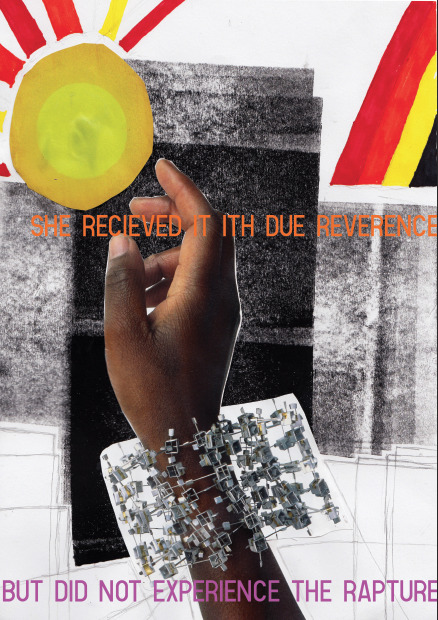
This all being said I'm confused over how the multiverse plays into this, the assignment was about creating art based around a narrative, not around other universes.
Two artists I felt influenced the art I made during the assignment were Brooks salzwedel and pokras lampras, Brooks' art I have already examined, still, he depicts floating land masses, and strange forested scenes obscured by mist, while pokras lampras is an asemic writing artist, his particular
Brooks salzwedel
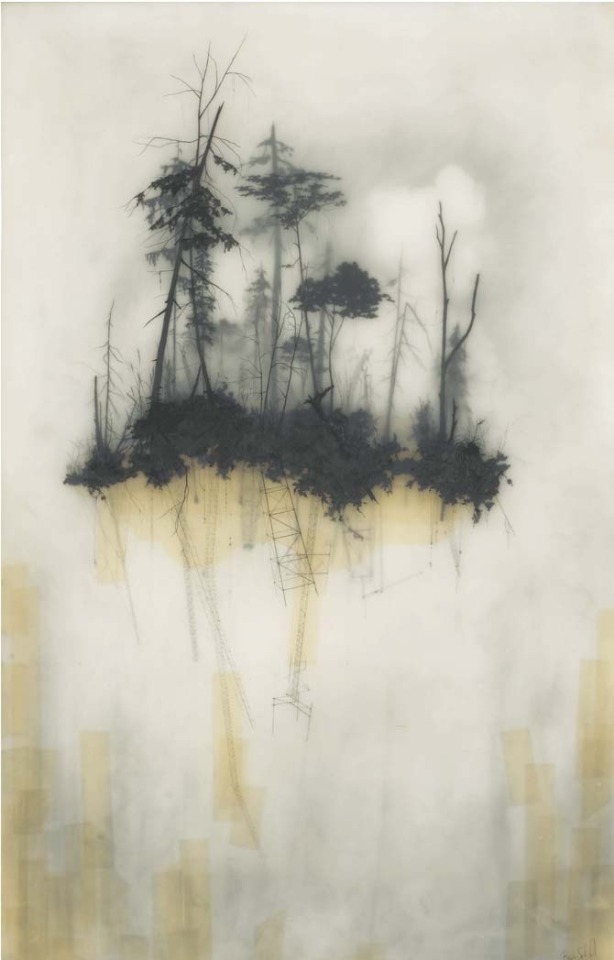
style was structured and merged aspects of Cyrillic, English, Greek and Arabic creating an interesting visual style.
Pokras lampras

What did we learn in lesson
This assignment did not focus on new artisic methods (in comparison to the last unit we learnt screenrinting, intaglio, chalk, graphite etc.) but rather ways to express ideas through it, in this case through the aforementioned narrative.
Animation:
animation is relatively simple, animations are composed of several frames, then the amount of frames per second will determine how the animation plays put, generally the higher frame rates are used for smoother, more high effort animations, 24 fps (Frames Per Second) is industry standard.
In a programme the last frame can be viewed to better let the animator decide where they want to go with the animation.
Light box art:
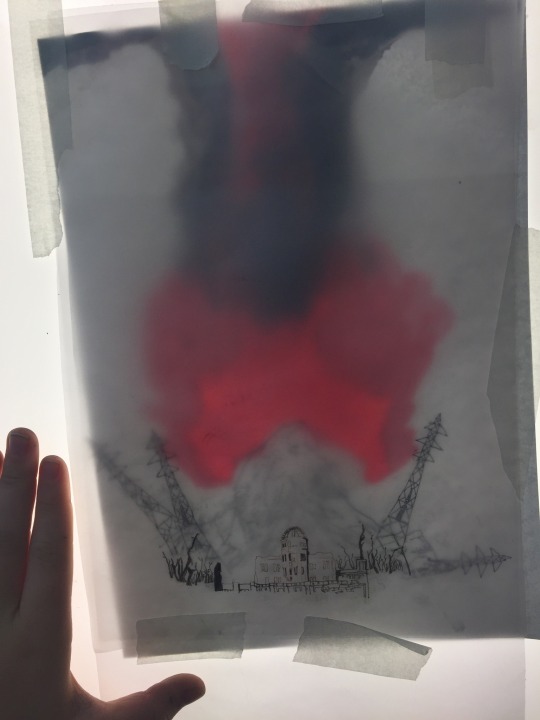
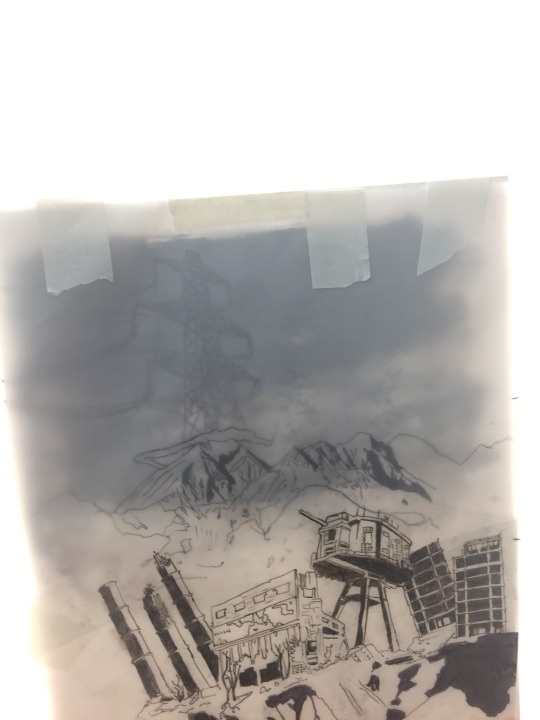
our light box art used tracing paper, each piece of paper was drawn on, the penned, the most 'misted' paper would be at the back, giving an impression of dictance, the paper in fromt would similarly appear closer to the veiwer.
Though as for what we used, screen printing, digital, painting, drawing were all used, of note was the continued use of animations in digital atr.
the use of light boxe was interesting particularly the use of layered tracing paper to create a obfuscated image, though I personally wonder how I could use them in my own art.
Out of lesson
digital art became my focus, I've found my transition from traditional methods difficult, lines are less stable, and dealing with confusing interfaces has proven itself difficult.
The quality of my artwork has been reduced as a result, but this is expected when moving to a new, unfamiliar medium.
Though digital art has allowed me to use colours freely, which again is difficult, as I never developed any real sense over how to use colours using traditional drawing methods.
Inspiration
Additionally I asked each individual artist the same three questions about their work, which were
what is your source of inspiration? (meaning what initially inspired you and what continues to)
how did you start? (what did you draw initailly, when?)
what processes and materials do you use?
void_illustration - Richard Saunders Illustration
Richards art either is obviously biological, where a creature is depicted, or has a distinctly biological edge to it, metals seem to bend,twist and stretch like flesh, nothing seems to be truly just a machine or device, rather every ridge, bulge and groove hints at a more organic truth to his figures and objects.
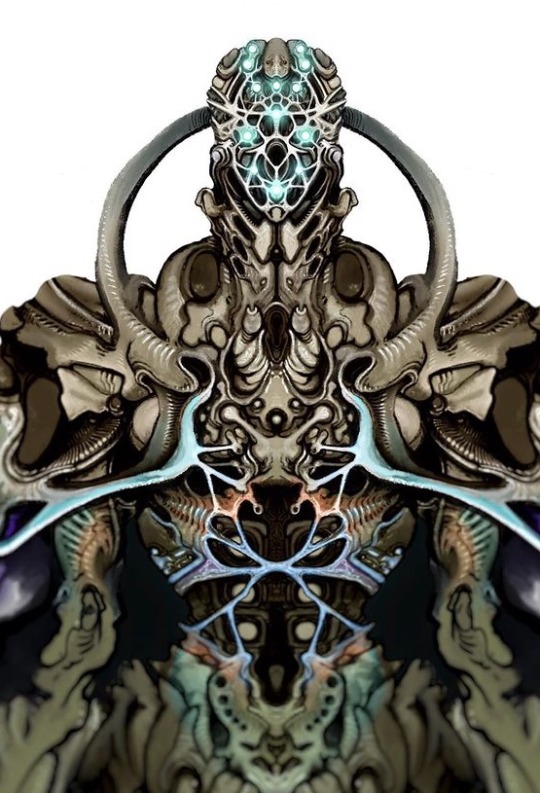
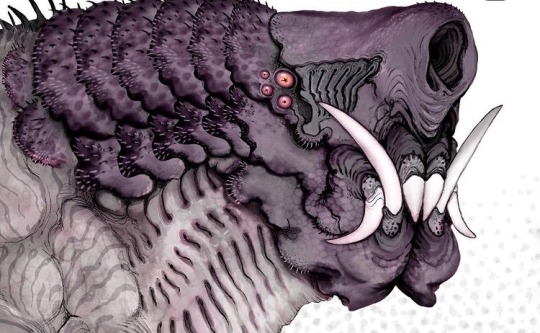
1. im inspired by so many things, its good to pull from a wide range of inspirations.
2. Ive been drawing for a long time, im not professional but im hoping to change that, most of my work forms into narrative universes and then develops on from there.
3. For materials I use a range. My 'bio warrior' series is mainly pencil sketches with marker colours and white paint pen highlights. My brown paper dragons are watercolour on strathmore toned tan paper, lined digitally, though I will layer them up further with paint and markers.
Fuelstains - Nikolay Georgiev
His work similarly to Richard's trends to directly be a creature or rather, monster, these organism often have strongly textured skin, often appearing to have many grooves, showing the musculature underneath, then there are his mechanical pieces, either directly depicting a machine of some kind, such as a robot, or depicting a human who has been massively altered by technological augmentations.
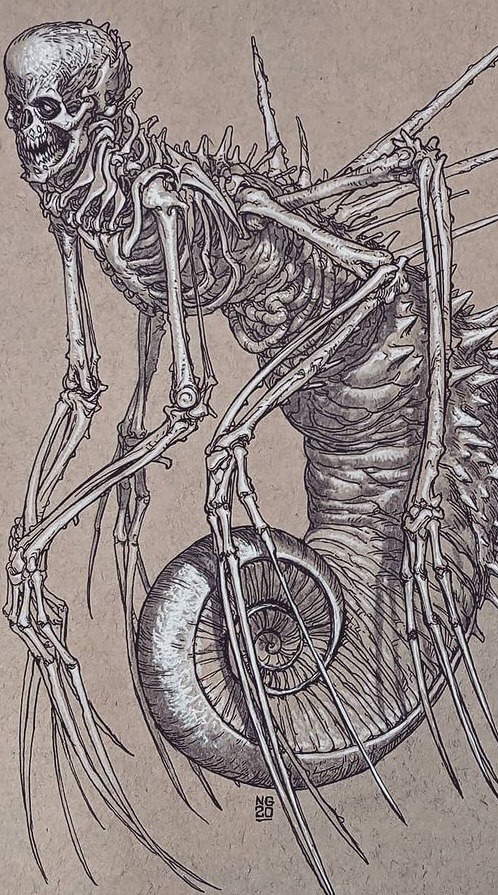
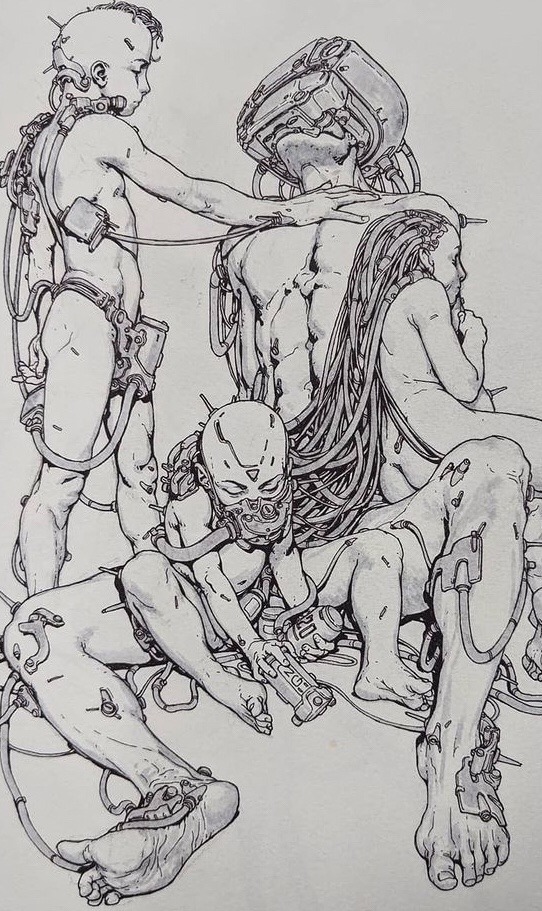
1.I was initially inspired by comics, as a kid, stuff like spiderman, bat man and transformers, but later on it could be anything that inspires me.
2.I started in primary school and it was mostly superheros or stuff from movies.
3.Pencil, ink fineliner, brushpen, watercolour, ballpoint pen, digital.
Milesr.art – Miles R art
miles' art focuses on creature drawings, particularly drawings of alien life, creating some truly bizarrely fascinating, most bearing little resemblance to earth organisms, if any. Another aspect of Miles' work that I appreciate is that it seems grounded, the animals, in spite of their bizzarreness still seem like they could exist.
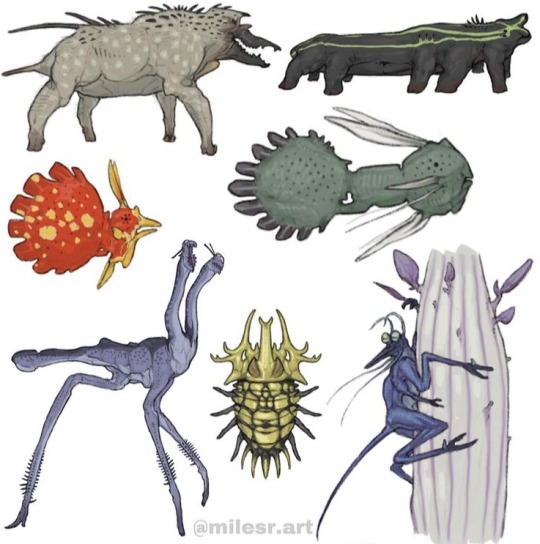
1.some of my biggest sources of inspiration:
- C.M koseman, Brynn metheny, and dougal dixon are some of my most inspiring artists
-just thinking about the natural world in general like on our planet
2.what initially inspired me to draw and that goes into number 2) in kindergarten I saw some kid drawing a honey comb pattern with neon markers and was like huh okay im going to do that but better.
And I always drew monsters and characters, always becoming more based on science overtime, and here I am now.
3.Now I exclusively make finished things digitally with my ipad pro and apple pencil using procreate, but I often make sketches on post it notes with just regular pencil. In terms of processes I feel like I just do what I do it, its hard to define ones process.
1 note
·
View note
Text
Weekly Wrap-Up - 9 Oct
Welcome to the 26 new followers who joined this week! I am nearing the end of my dissertation, which is due in ten (10!) days, so as I finished up editing, my weekly wrap-ups will similarly change. I am also considering doing some outtakes of [concepts, examples, etc.] that I could not quite fit in my dissertation, which will be spread out over the coming weeks
Things I posted
Parts 1, 2, 3, 4, and 5 of the bookbinders chapter! Thanks for being so patient. These sections cover:
ficbinders’ motivation for printing and binding fic,
how this practice constitutes fannish response in the fandom communication circuit,
tensions with traditional book publishing, and
the challenges of material preservation.
I leave the chapter asserting that the preservation of these objects, like fic itself, will likely be a self-driven endeavor. I think pursuing fan studies as book history will similarly be so.
how fanfiction follows a history of commentaries as literature preservation
a redux of my thoughts on slash and fetish, where I clarify some of my earlier comments, lest they be misconstrued! TL;DR - fans write slash paritally bc they are constrained by their source material, which usually centers male characters, not because they fetishize gay and queer men. fetish appears in slash bc fetish appears in all art about all subjects.
a response to @armoredsuperheavy‘s great post on how canonical imperfections generates fic and why small stories are worthwhile
and a short story about one of my most unforgettable uni professors
Things I recommend
I watch the ‘Leap of Faith’ scene from Spiderman: Into the Spiderverse every time I need a serotonin boost. The entire film is a masterpiece, and if you want a quick look at the motifs in the soundtrack, Sideways has, as always, delivered. Learning a little more about the musical phrases of the film makes me appreciate this powerful moment even more
Things I’m thinking about
purposefully consuming bad media: I’m not on Twitter, but friends sent me round-ups of tweets about ‘Emily in Paris’, the new Netflix show that sounds like an old-school children’s book a la ‘Elouise goes to the Beach’ and has the same emotional depth. I dabble in self-indulgent hate-watching as much as the next person, but I genuinely couldn’t bring myself to get through this show. But what’s appealing about hate-watching in general? For me, as someone who enjoys enjoying things, I think there’s a release in knowing that I don’t have to relinquish more of my brain space to carry encyclopedic knowledge of a show. With shallow content, this is doubly easy.
citation styles. I had to learn MHRA for all of my course papers this year, which is kinda like Chicago (my preferred style). I’ve been perseverating on how to cite Tumblr posts in my chapters, which lead me to considering what types of information are important for the reader regarding sources. everything comes back to information management!
#weekly wrap-up#dissertation#research#chapter 4#bookbinders#armoredsuperheavy#research reflections#writing reflections#academic shitpost
2 notes
·
View notes
Text
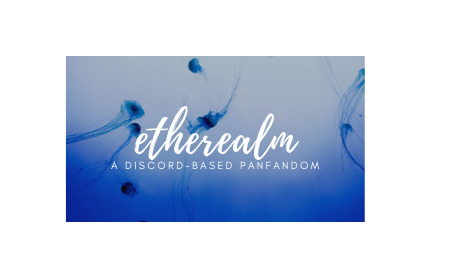
Welcome to Etherealm!
As a canon-only panfandom with a small laidback 18+ community, Etherealm is a semi-open sandbox focusing and encouraging player-driven plots, world-building, and character developments. We're third-person, paragraph style with no word count! When characters are suddenly taken from their own world without warning, they wake up on a seemingly desert island where a new life - and a new world - awaits them.
FEATURES
Mainly SFW but 18+ community!
Vast crossover of canons and fandoms!
Simple claim and application process
Tupperbox Bot for in-character posts
No word count to multi-paragraph replies
Monthly activity check!
Ability to request new location channels
Blacklist and trigger warning list
One moment, your life seems as normal as it can get for you. The next, your eyes fall close. You sink into a deep slumber.
And you wake up on the island.
Strangely-mundane, water for miles and miles, civilisation hasn’t seemed to touch the white sandy beaches, rocky cliffs and overgrown jungle, but yet there the lighthouse stands.
A beacon in the otherwise wild and empty landscape, for all the lost souls to see who wake up here, the lighthouse stands in decadence. Instead of going up, inside there is only a tunnel going down.
And down.
And down.
Underground, underwater, whether several minutes or several hours, the foyer of a secret city welcomes you.
A grande hall with walls made of crystalline glass, a dome deeply submerged into the water surrounds you. Only the light of bioluminescent fish and plants illuminate the room, yet you have no problems making out the huge double doors leading into the city.
Leaving the tunnel behind, you move across the marble floor, curiosity dragging you forwards, and as you approach, the doors open on their own, inviting you to take the next step of many more yet to come.
Welcome to Etherealm.

RULES & GUIDELINES
1. Respect. Our most important rule is to respect your fellow members. There is a zero-tolerance policy for hate speech, harassment, flaming or any form of bigotry, including but not limited to: racism, sexism, queerphobia, transphobia, ableism, elitism, etc. Best thing to do is be kind (including to yourself!) and think positive!
2. Members are required to be 18+ to join. As the first step to joining this server, you'll want to verify your age by simply posting it in #welcome-verification. This channel is private and no one but the Staff Team will be able to see your age, if you do not want to publicly disclose it.
3. Introduce Yourself. As the second step to joining this server, please be sure to #introduce-yourself and follow the provided template pinned within that channel! Not only will this help the community to know each other a little better, but will also help in letting us know your preferred OOC name, pronouns, any triggers for our list, favourite fandoms, etc.
4. Check Roles. Please remember to check and respect the roles of other members! Thanks to our #self-roles, members can assign their preferred pronouns, DMs and roleplay status, tagging preferences, etc.
5. Ready to Roleplay?. We know you’re excited to get started, but please do not post in any of the in-character channels until you've perused our taken #canon-list, claimed your character via submitting your completed Character Claim Form to the #character-registry and created your character's Tupper profile via #character-tupperbox.
6. Canon-Only. We are a canon-only roleplay and allow characters from nearly any fandom with the exception of unpublished works, anything geared towards a preschool audience, or anything deemed purely erotic in nature. With the exception of some larger fandoms (IE: Marvel, DC, etc.), players can only claim two canons not significantly connected per fandom. In addition, only one iteration of a character can be claimed unless differing significantly enough to be considered their own unique separate character.
7. Characters. The maximum number of characters that can be claimed is 13; however, please do not claim more than you can handle. First three characters are always free and can be claimed/reserved immediately, with any more requiring a five day wait from the last character applied for and for each character to have taken part in at least one in-character scene.
8. Activity. Due to the nature of panfandoms, all characters are expected to post at least once per month to be considered active on the server, although more is highly encouraged and recommended. Player activity is checked on the 8th of every month, meaning characters will have from the 8th of the preceding month to the 7th to post and share an example of their activity (see: for the current month's activity check channel). For any players unable to be active but wishing to save their characters, please notify us of any , although please be aware you may be asked to reconsider any additional characters after any repeated or prolonged absences.
9. No Plagiarism. Plagiarism is not tolerated. While the character concepts are being borrowed from copyrighted work, you are not allowed to copy and paste from Wikipedia or any other source unless properly quoted. Do not claim or present any material you haven't written as your own. Similarly, the same goes for artwork and please remember to credit when sharing.
10. No Godmodding, Metagaming, or Powerplaying. Do not control another character without the player's permission or take information only available OOC and use it IC. Similarly, be realistic when roleplaying out your character's capabilities and talk to your partner(s) about anything affecting their characters.
11. Mature Content. While adult themes are permitted, we operate a 'fade to black' policy in the SFW channels. Any mature, triggering or otherwise graphic content is required to be marked with a warning and censored, or else rped in the available NSFW channels. Any characters under 18 (or appearing to be) may only be involved in age appropriate relationships and are forbidden from participating in any sexual-related content. Please refer to the #blacklist-and-triggers for a more detailed listing on what, how and when to censor.
12. Writing. All roleplay posts must ideally be written in third person, past tense. Although we do not expect perfection and understand English is not everyone’s first language, posts must be legible. We have no word count, so you can write as much or as little as you like, but please be sure to give your partner(s) something to respond to.
13. Channels. All our channels are private channels! In order to join an ongoing scene taking place in a channel, please ask permission of all the players involved. The only exception to this rule are channels or scenes marked as open (see: #open-tagbox & #channel-directory).
14. Communicate. Please ensure to communicate with your writing partners! This can be regarding certain triggers and squirks, as well as establishing boundaries and getting permission when engaging in fight scenes (such as for potential injuries) or anything of a sexual and/or romantic nature. Any in-character conflicts should remain as such, with any out-of-character drama kept off the server.
15. Scenes. Please be aware it is one scene per channel. Once a scene has ended, a new scene can begin. If a channel goes a week without a reply, the scene can be 'paused' for the channel to be re-opened and the players involved in the paused scene can either headcanon an ending or else continue it at a later date once the channel is free again.
16. Time. Due to the mysterious nature of the world in-verse, the in-character channels operate on liquid time and players are encouraged to keep track of their own personal timelines. For this reason, characters can participate in multiple scenes at once and there is no roleplay lock.
17. Have fun!
Discord Link: Click me!
6 notes
·
View notes
Text
Why I wish people would stop saying Steven Universe is ending
All right y'all, I know I'm not the only person saying this but maybe I can help put this into perspective for you.
No, there is no indication that Steven Universe is ending or has ended.

It's not difficult to see why some people are suggesting this. It's largely based on how quickly longstanding mysteries were wrapped up in "Change Your Mind" (bringing back Jasper, what is Steven's "real" identity, what happens if he loses his Gem, finding a workable treatment for corruption) and how many long-awaited elements were spotlighted in the episode (Lars and Sadie reuniting; the Off Colors making it to Earth; new outfits for everyone; the appearance of a Steven/Pearl Fusion, a Steven/Garnet Fusion, and a reveal for the modern version of the Temple Fusion). Combined with a reprise of the theme song and a special-length epic episode, it's hard to not read this as a finale.
It's certainly written as one. Not necessarily for the show, but for an arc they built and fed into for a long time.
So I understand. I do. But.
Please stop saying it's obvious the show is over because YOU can't personally imagine what they could do next.
I'm seeing a lot of this. "What else do they have to wrap up? They montaged through all the stuff we had left to see. There's nothing else to do. The dangling threads they did leave aren't enough to make another season about. I can't imagine they have anything left to tell us."
That's right. YOU can't imagine, naysayer. But they can, and they have.
Remember when some scenes from the "Heart of the Crystal Gems" arc and the episode "Legs From Here to Homeworld" leaked, causing popular fan theorists and even reputable news sources to start blasting CARTOON NETWORK SPOILS THE FINAL EPISODE OF STEVEN UNIVERSE?


Remember how people were saying "well obviously if the Diamonds are interacting peacefully with Steven, that's the end, that has to be the last episode, it's over"?
They COULD NOT IMAGINE that we had anywhere else to go from there. They COULD NOT IMAGINE that the show would take us beyond that to a place where conflict and resolution were still out there to explore even if it didn't involve these particular characters beating up on each other anymore. There were so many people who were so sure this couldn't be a thing unless the show was ending--that they said it with confidence, they said it uncritically, they said it in multiple reputable news stories.

They were wrong. Those scenes happened in episode 153 and then there were more than half a dozen more episodes since, proving that those scenes did not come from a final episode.
But now people are making the same mistake again.
I realize some of you are used to seeing this sort of thing when shows end (at least, on the shows that get to choose their ending instead of being cancelled and cut off). I realize that this FEELS very final because of some of the tropes and tells they chose. But I find it really baffling that so many fans are ignoring all these other reasons to know the show is continuing:
The movie was promoted right after "Change Your Mind," slated for fall 2019. If they have nowhere to go from here, what do you think they're making a movie about?
The voice actors, writers, and creators have repeatedly discussed continuing sessions and future plans in all the supplementary materials--podcasts and tweets give you audio and visual evidence that content is still being made. What do you think they're doing with that stuff if there's nothing else to this story?
There are many plot and character threads we can see addressed still--not only those set in place by the circumstances of "Change Your Mind's" ending, but those unaddressed, like what is going to happen to the Zoomans and the Famethysts and the bubbled Rose Quartz Gems, or what the heck is in Lion's treasure chest.
This package of episodes created a satisfactory ending to what episodes had been ordered at the time that they were written. Matt Burnett and Ben Levin left the show following this season (to write Craig of the Creek), and they've discussed how they have come to the end of the episodes that were ordered when they completed their work and departed. (And now they've joked that if they want to find out what's coming next, they just walk over there and peek. It's got to still be going on for them to do that.) It feels the way it does because they did write it with a stopping point. There have been a few of those ("Ocean Gem" was another one).
TV is a difficult medium to write stories for because so much is unknown about the future of your show, so you have to be flexible. They wrote it so they could go on or not depending on how the dice fell. They fell to give us more.
I know we don't have an "official confirmation of Season 6," but seasons have consistently been meaningless on this show. (I remember seeing Ian Jones-Quartey express frustration with fan fixation on how to define what goes in what season, since it's pretty arbitrary.) Some people took information they THOUGHT they knew (that they did not know) to explain to others how many episodes we could expect and how the story would therefore unfold, but they were wrong. Unless they are insiders, they will continue to be wrong if they keep basing their understanding of how this show will be handled on how other shows usually handle their storytelling.
ON THE DAY THAT STEVEN UNIVERSE DOES COME TO AN END, I believe (but don't KNOW) that the process will be more like Adventure Time's was: Adventure Time was handled very similarly to Steven Universe in many ways, and when that show was determined to be ending, not only was there an announcement that SAID SO, but then we also got little milestones along the way featuring boarders and writers finishing their last episodes, and then more than a YEAR later the finale finally aired. Given that, I'm confused why people seem to think it's logical that Steven Universe would just end there with no explanation and no announcement. You haven't seen an announcement about it wrapping because IT ISN'T DOING THAT RIGHT NOW.
I know I don't speak for everyone, but considering how well this show handles its reveals, I think it's really arrogant for fans and critics to insist it has nothing else worthwhile to show us or will necessarily go downhill from here if it continues.

I feel it has a wonderful mixture of reveals that no one sees coming and reveals that we predicted (or could have). It consistently finds a way to do things we expected in ways we didn't, or to throw curveballs that we retroactively see were supported with subtext and subtle tells. If you're honestly telling me you've watched this show for five seasons and you don't trust it to surprise and delight you again, I'm confused about what show you think you're watching. I’m not demanding people love it, and I’m not saying you can’t criticize it or wish for more content or different content with your favorite characters or plot elements, but if you're still here watching this show and you're not just hate-watching it at this point, give it some breathing room. I wanted to write something comforting here to reassure people that there's no indication the show is ending, but I'm honestly just kinda angry at all the pessimism and naysaying.
I remember when "Escapism" premiered on the Steven Universe Podcast, context free, and everybody had a theory about who sang it. There was so much arrogance! OBVIOUSLY this is a Lapis song. Oh wait no, that doesn't make sense now that she ran away and came back. OBVIOUSLY this is a flashback Pink Diamond song. OBVIOUSLY this is a White Pearl song. OBVIOUSLY this is Steven song, a Blue Diamond song, etc. People thought they were reading black and white messages but they were not. They were developing headcanons and becoming so confident about them that they developed expectations about what this song owed to them. Guess what? The song was Stevonnie's voice as a soundtrack to a possessed watermelon. You didn't know. And you don't know now.
Please listen to what the actual Crewniverse people are telling you about the ongoing production of the show and stop spreading the misleading information that it is known to be ending. I believe we will be given time to handle that news, like we were with Adventure Time, and that like most things with Steven Universe, it will complete its story gently, gracefully, and with resolution to questions and arcs--both for those we've had for some time and for those we don't even know are coming yet.

Trust in the imagination and heart that inspired this show. All evidence suggests they have plenty more to share with us.
tl;dr: Just because someone can't imagine what might come next in Steven Universe doesn't mean the show is ending. There is overwhelming evidence that there is more, and some people in this fandom have a history of unfounded overconfidence in their expectations for its future. Wait and see.
#steven universe#su spoilers#steven universe spoilers#gif#long post#change your mind#su analysis#my su analysis#myblog
2K notes
·
View notes
Text
Ascendance of a Bookworm Review
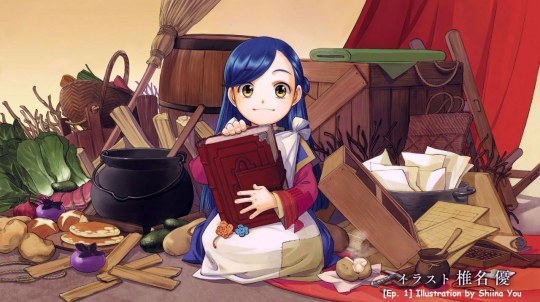
Ascendance of a Bookworm is an isekai light novel written by Miya Kazuki and illustrated by Yu Shiina. It follows Urano Motosu, or rather Myne as she is known in her new world, as she pursues her one true passion: books. In her past life, Myne had just graduated college and was set to start her dream job as a librarian until an earthquake hit while she was in her book-filled bedroom and she was crushed to death by her massive book collection. As her consciousness fades, she wakes up as the 5 year old sickly Myne in a world where paper is made of parchment too expensive for anyone but nobles to buy and use.
It's anime adaptation has two 14 episode seasons. The first season aired in Fall of 2019 with the second closely following up in Spring of this year. Both the anime and light novels are incredibly enjoyable, but I will actually be focusing this review on the light novel series as I found that I prefer it over the anime. That's not to say that the anime is bad. The light novels simply offer a lot more detail and depth to the already detailed world building that appears in the anime.
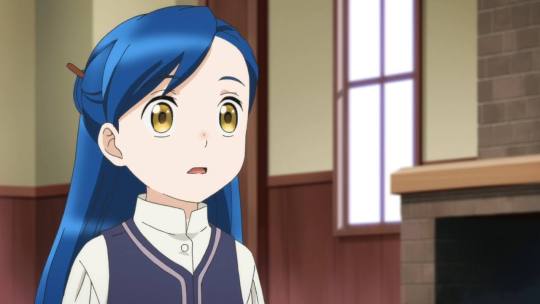
As you can see, the anime adaptation’s animation and art style is not much to look at. It certainly is not a sakuga filled series, but it does have its charm. Personally, it reminds me a lot of late 2000s series and fills me with a sense of nostalgia whenever I watch it. The art style is quite cute and simple. The light novel’s illustrations are similar, but have a bit more detail and shine to them. As is also true for the characters, world-building, and writing in general.
Given how detailed and intricate everything about Bookworm’s writing is, you may be surprised to know that the series is heavily character-driven rather than plot-driven. With a world as detailed as this, one might expect it to be filled with political intrigue and plot-driven drama. However, our main character, Myne, is so incredibly defined by her straightforward desire to have and read as many books as possible that there’s simply no time for the writing to expand on plot-driven story beats. As proven by when some volumes add more plot-driven story beats and end up being longer than usual.
With all that said, Ascendance of a Bookworm is very slow paced. In a series about making books, the anime doesn’t even give Myne paper until episode seven and proper books aren’t produced until later in the second season! That may make some people turn away. If you like your fantasies to be action packed, then Bookworm may not be for you. Even so, I implore all of you to give this series a shot. The slow-pacing does have its pros for readers looking for that sweet sweet cathartic feeling. Miya Kazuki has a talent for knowing the exact time and place for when certain things about her world should be revealed. And as such, she has developed a writing technique that reaps all the benefits of an isekai story while also not making it jarring for the reader.
By that, I am referring to exposition. Isekai stories have protagonists that know nothing about the fantasy worlds they live in, but with all the knowledge of their previous world. This gives authors the excuse to have the main character ask questions that the world’s inhabitants know as common sense, but still have things explained to the audience. If authors aren’t careful, these exposition dumps can be boring at best and immersion-breaking at worse. But Miya Kazuki has created characters and a world that creates perfect circumstances for seamless exposition.
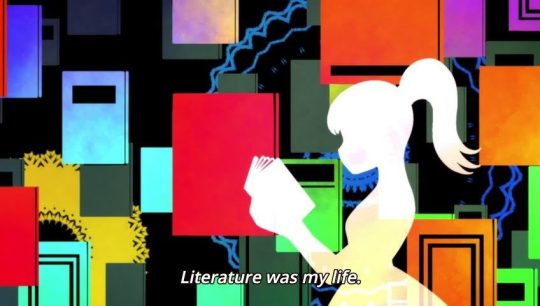
First, we have Myne or Urano Motosu. A bookworm among bookworms. With a one-track and somewhat forgetful mind, all she knows and loves is books. She is an absolute delight of a character and while her development is just as slow as the story’s pacing, it is a wonderful experience to read it all unfold. Her desire for books leaves her selfish and uninterested in everything else, which does her no favors. Myne is a low-class peasant. Born the daughter of a soldier and seamstress, she already shouldn’t know much about the world outside her lot in life. But to make things worse, Myne’s body is very sickly. Racked by a mysterious fever that has forced her to practically spend all her time inside and thus, doesn’t even have the knowledge of most kids in the same class.
Her first real source of knowledge about the world she’s been reborn into is Lutz. A neighbor and youngest son of four, whose perpetual hunger and desire to eat the tasty food that Myne makes leads to him becoming close friends with Myne. Lutz is with Myne throughout her entire journey and learns just as much as she does about the world they live in. Afterall, Lutz is also just the kid of a low-income family. The life Myne was born into not only serves as a fantastic way to immerse the reader into world-building, but also ends being a great vehicle for exploring the issues of a heavily class-based society. Even in this world completely separate from our own, somehow Miya Kazuki manages to make some pretty bold commentary on class-based society as a whole.
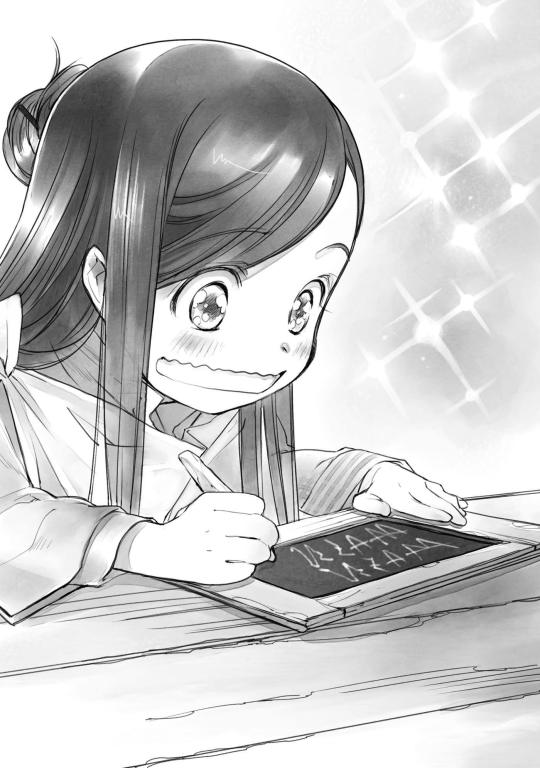
Most light novels use fairly simple language, but even knowing that I think Miya Kazuki's writing style is even on the simple side of that. I don't blame her for that though, since her world and characters are so incredibly detailed that if she used flowery prose, her series would probably be the biggest and longest light novel series ever made. Some may not like how her style leans more toward "tell don't show" but it is still an incredibly well-written story with very compelling characters. Not to mention that this simpler writing style lends itself to some really great comedy.
That being said, Miya Kazuki’s writing often does that weird thing that happens in anime where something happens on screen and then the characters say out loud what just happened, except in written form. Which sounds terrible, but actually works a lot better in practice. It allows character interactions to flow a lot more freely and the simplistic writing allows for a lot more detail to be added. And due to Miya Kazuki writing the characters the way she does, there’s no boring or immersion-breaking exposition.
This writing style is not a product of the translation either. I have had the absolute pleasure of picking up (searching up) the web novel and experiencing Bookworm in Japanese as well. And as a side note; if any of you are upper-intermediate Japanese learners and are looking for Japanese reading material that’s simple enough for you to understand most of it (not mention fun to read), but also offers a bit of a challenge then check out Ascendance of a Bookworm’s web novel here: https://ncode.syosetu.com/n4830bu/. Bonus tip: Download the yomichan and/or rikaikun extensions on your browser for optimal reading time. Anyway, I can assure you that the translator behind Ascendance of a Bookworm is not muddling the writing style or the reading experience in the slightest. Miya Kazuki’s story and writing style comes through very nicely in the official releases.

Ascendance of a Bookworm is one of the most thoroughly realized stories I have had the pleasure of reading and watching. The anime is, of course, quite good, but I also highly recommend the light novel series even if you’ve seen the anime three times over. Miya Kazuki is an amazing writer and the official translations are quite good. If you’re like me though and like to binge series as quickly as possible, you might find yourself waiting aimlessly for more when you finish the anime and current English light novels. If you’re of intermediate or higher Japanese level, you can always read ahead in the Japanese web novels. Or you could seek out similar series. I recommend everything written by Nahoko Uehashi. Her novels are similarly well-realized fantasy stories with anime adaptations. Or, more obscurely, check out the fantasy series, Saiunkoku Monogatari. Its animation and art style gives me a similar sense of nostalgia and also has a great story with compelling characters. Anyway, I hope this review helped to convince you to give Ascendance of a Bookworm a shot, whether that be the anime or light novels.
1 note
·
View note
Text
The surprising similarities of Doctor Who and Twin Peaks
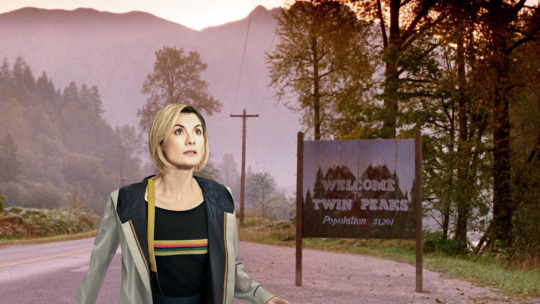
Earlier today, a friend of mine asked me why I chose to do a blog about both Doctor Who and Twin Peaks. He thought it was a very odd pairing. While explaining to him some of my various reasons, I realised that it would actually make a rather interesting article to talk about the similarities between both shows. Believe it or not, there are several. My hope is to possibly garner new interest in either show for Whovians and Peakies alike.
I know a lot of you are here for the Doctor Who content, but I would like to think that a sliver of you are also interested in the Twin Peaks content. That being said, this article will contain some minor spoilers for both Twin Peaks and Doctor Who. Though I will try and maintain the central mystery without giving too much away. I’ve toyed with the idea of writing articles about Twin Peaks outside of episode recaps, but I’ve always shied away for fear of spoilers. Consider yourself warned!
A tale of two pilots
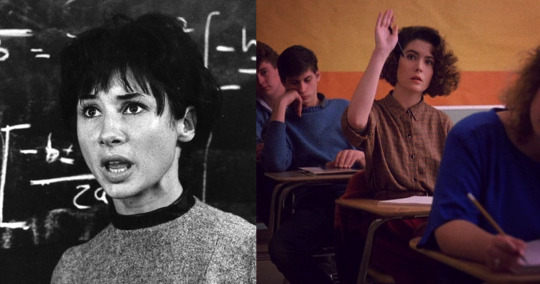
I’ve gone over this in previous blogs that both Twin Peaks and Doctor Who have two separate pilot episodes, albeit for totally different reasons. In the case of Doctor Who, the second pilot was filmed after it was decided that the first one failed to capture the correct tone for the Doctor. Because of this, a reshoot was done, softening the First Doctor’s irascible temper to something more relatable. His cantankerousness was dialled back to rebelliousness, and our protagonist began to feel less like the villain.
In the case of Twin Peaks, the second version of its pilot episode was filmed for the sake of European markets. Having had a rather profitable year, the network ABC was willing to take a gamble on a dark horse in the form of a little project from Mark Frost and David Lynch. However, they only ordered the one episode upfront. Figuring it may never see more than a pilot, an extended version of the episode was filmed to include a conclusion of the story for European markets. While this version of the pilot was not aired in the states, it is widely available on DVD release.
This may seem like a tenuous connection at best. But both of the unused pilots can be viewed as a means to further understand their respective shows. Seeing the Doctor act like a jerk gives a bit of insight into just how far is too far. People may complain that the First Doctor is a cranky old man, but seeing the original pilot of "An Unearthly Child," really illustrates the delicate nature of that balance. Similarly, watching the masterful work of David Lynch’s perfect introduction of Twin Peaks wrap itself up in a clunky, tacked on extra thirty minutes feels just as hollow. People may complain that Twin Peaks leaves too much to mystery, but seeing it end in a shootout makes you appreciate the ambiguity of later episodes. Both pilots prove that sometimes less is more.
Time Off

Both TV shows were cancelled and subsequently brought back to air years later. After 26 seasons of travelling in time and space, Doctor Who had been booted by the head of BBC. After only two seasons Twin Peaks was cancelled by ABC, far before its time. Later, both series attempted a sort of reboot, or revival in the form of movies, both of which were panned by critics. At this point, the only places either show really existed were within the hearts of fans. You may have seen the occasional convention, magazine, or book, but it would appear that both beloved series were dead in the water.
However, it is that very flame kept lit by the fans that gave each series its respective cult status. After years of fans wondering if their favourite shows would get the revivals they so deserved, it would seem their prayers were finally answered. Oddly enough, neither show was a complete reboot, with each acting as a continuation of their original storylines. While each revival has its share of detractors, purists who prefer the original show, overall they were both considered very successful. Much of this is owed to the fact that the creators opted not to be slavishly devoted to the source material, but to instead make something new that still managed to respect the past. Instead of purely playing into nostalgia, they make a case for their own existence by being something new.
Some not so familiar faces

One of Doctor Who’s greatest strengths is that it was able to inject longevity into the show by introducing the concept of regeneration. While most shows die when their actors leave the show, Doctor Who was able to write replacing the actors into the narrative by making it a biological function of the main character. Like Mary’s claim of a virgin birth, its an idea so unique that you can only get away with it the one time. Anyone who replaces their actors in such a way would just be copying Doctor Who, right?
Enter Twin Peaks. Aside from outright replacing actors, as in the case of Donna Hayward in “Twin Peaks: Fire Walk with Me,” David Lynch has taken a rather novel approach to replace actors who have either died or refused to return. Take, for instance, the actor Michael J. Anderson who played “The Man from Another Place,” (or the Arm) in both the series and the movie. After a payment dispute, Anderson claimed that he was “irreplaceable.” And when you consider just how deep his character goes into the mythos of Twin Peaks, it’s hard to disagree. That is, unless you’re David Lynch.
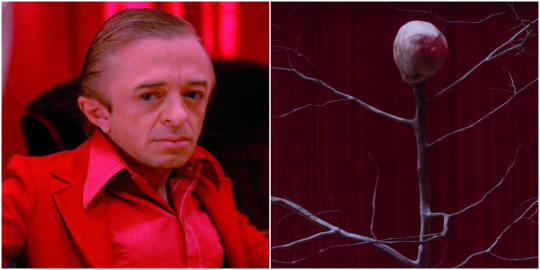
Lynch’s solution to losing Anderson was to simply replace him with a central nervous system/tree with a brain like a wadded piece of chewing gum for a head. And you know what? It actually worked. Referring to it as a sort of “evolution,” the audience needed only to take a moment to bask in the brilliance, and then move on. The same method was used to replace David Bowie with a machine that resembled a tea kettle, or the villainous Bob with a floating black orb containing his face. No actor? No problem.
The surprising fact is that the mythology of both shows was able to sustain what would normally be considered insane narrative choices. As opposed to jumping the shark, these changes actually deepened the mythos of either show. From their conception, both Doctor Who and Twin Peaks are so unique that they have been able to write, and rewrite their own rules.
Relative dimensions in space
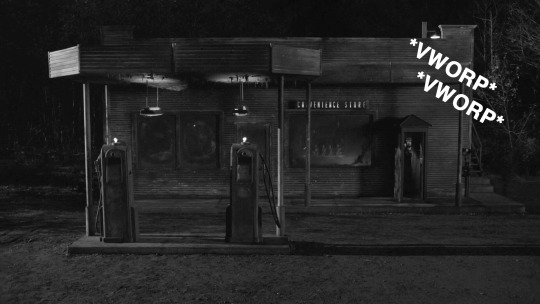
Whether it’s a blue police box that is bigger on the inside or a convenience store that disappears like a TARDIS, neither show seems all that interested in obeying the laws of physics. Physical space is a minor obstacle to be manoeuvred around with an almost godlike technology bordering on magic. We see creatures using otherwise mundane objects to completely sidestep reality. Pictures hanging on walls are portals into entire worlds. Stuccoed buildings act as gateways opening up to boxes floating in space. Portals open deep in the woods to take us into terrifying dimensions that boggle the mind.
Interestingly enough, both shows approach these elements seemingly from opposite ends of the spectrum. With Twin Peaks, what has been hinted at possibly being aliens, may actually be something more spiritual. With Doctor Who, something that is hinted at as spiritual is usually aliens. Regardless, in both instances, matter is simply a plaything of beings far more advanced than we mere mortals.
Time and time again
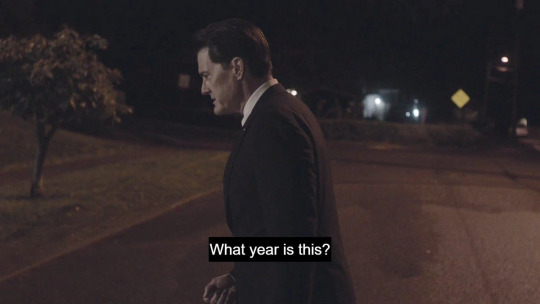
Wibbly wobbly timey wimey stuff isn’t just a thing that affects the Doctor. The heroes of Twin Peaks also experience their fair share of time displacement. Whether it’s a hole punched into the universe by an atomic bomb that imprints the 1940′s onto a dimension visited by Lewis and Clark, or a trip in the TARDIS to the time of Lewis and Clark, both storylines are tangled in a web of timelines threatening the fate of everyone involved.
As we learn with the Doctor, so too do we learn in the case of Dale Cooper that toying with timelines is not an exact science. Distortions happen. Things change. People tend to disappear. Once you cross that threshold, it could all be different. Even with the greatest of plans, our heroes in the fight between good and evil may find themselves in a never-ending battle. At the end of the day, even the best of intentions can be undone by a simple time loop.
They both changed television forever
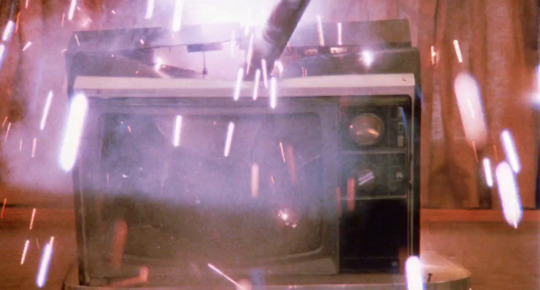
From their very first episodes, both Twin Peaks and Doctor Who aimed to be something different. I’ve said in the past that Doctor Who operates on a level of surrealism rarely seen in science fiction. In a similar manner, Twin Peaks injects a heaping dose of the surreal into both the soap opera and police procedural genres. Because of this, they each come off as incredibly unique stories that stand apart from everything else. Many imitators have come and gone in the years since, but very few have achieved the same degree of success.
These aren’t just lighting in a bottle moments either. The unique nature of either show acts as a response to what came before it. These are deliberate choices to make something different. Sydney Newman’s edict of “no bug-eyed monsters,” while widely ignored, actually speaks to a greater desire to make something of substance. Much in the same way, Twin Peaks exists as a comment on the shallow nature of murder mysteries of the day. Instead of focusing on the murderer, it focused on the victim and how such a crime can destroy a small town.
In their own ways, Twin Peaks and Doctor Who aimed for something deeper. Audiences weren’t just asked to experience terror. Violence was not just a thing to ramp up the tension. Along with the darkness, came a lot of light. The relationships between people were just as important as those between good and evil. Pure joy is a thing to be celebrated, and not scoffed at through pessimistic edgelording. The full spectrum of human emotion is not ignored to service a “clever,” plotline. Even though both shows occasionally lost sight of this principle, they were always at their best when, at their cores, they celebrated life. It is as the Second Doctor said- "There are some corners of the universe which have bred the most terrible things. Things that act against everything we believe in. They must be fought.”
#doctor who#twin peaks#bbc#abc#twin peaks fire walk with me#david lynch#mark frost#thirteenth doctor#an unearthly child#dale cooper#laura palmer#time travel#Time and Time Again#TARDIS#Regeneration#first doctor#sydney newman#verity lambert
8 notes
·
View notes
Text
On Research: Worldbuilding and Culture

Hullo, in this post I’m going to talk about how I research and do world-building for my stories!
I’m doing this through the following ways:
1) using chapter 1 of my historical Taegi fic to illustrate what I did to research the era and the culture for that period,
2) providing the templates and tools I used in the hopes that it can help some of you all writers if you ever want to write your own research-intensive stories or original fiction that requires world-building!
While I’m using my BTS Taegi fic as a means to explain my process, this post is for any sort of writing project - original or fanfiction. If you follow me for fic, though, there will be chapter 1 spoilers for it. So if you haven’t read that yet, be-warned that there be spoilers below!
> How I do my research/world-building:
If your idea for the actual story is agnostic of time-period or setting, identifying that is possibly the first step. My initial idea for this story was to have it take place during a war (the Imjin War between Japan and in 1590s was the first choice) but finding the spooky landscape to set it against while also maintaining the drama and tension of a battlefield was going to dilute the characters and their inner conflicts.
So I went back to reading about Korean history in broad terms (Google Books is your friend) , trying to locate a time-period to set my story in. I finally chose this time-period because it was very interesting to me in multiple ways.
- it’s still a way away from the big social reforms in Korea in the 1800s that would push it into the Modern Period of history
- it was a time period when common people and peasants began to lose trust in the king and the upper-class bureaucracy, leading to peasant rebellions and some villages stockpiling their own grains
- it is a time when global influences were beginning to creep into Korean society, including Christianity. In fact, just a few years from this, a major wave of persecution would be unleashed against Catholics in Korea.
- I chose this time-period also because I wanted the level of organization of society that’s in this fic. It’s been established already, which means the characters are at a point of history where things are more or less stable in terms of what is expected of them as a member of this society. I needed that stability to create a quieter sort of period mystery.
To research for this story (or any other), once I pick the time period, I start looking for answers to my biggest questions:
1) how did they live: this includes food, travel, interests, societal hierarchy and organization, family structure, music, religions, and mythology. Basically, anything that they shared as a cultural group. In doing this, I had to separate royalty from common folk, because so much history is written about the royals and there’s so less about the folk. I looked up everything from the food that the common people ate to the issues they faced (winter and the gap between rice and barley cultivation was a huge aspect; so huge, in fact, that the popularity of kimchi can be attributed to needing a protein source in the winter that wouldn’t go bad). I looked up clothes and fabrics and the layout of villages. I looked for traditional crafts. And when I did, I found myself going down rabbit holes about caste professions (the shaman, for example, is of low caste in Joseon society, which was surprising to me considering so many period fics I’ve read has depicted them in a different fashion.)
I know that this feels very disorganized and random, but that’s because I have been doing world-building—both fantasy and historical—for a long time, and my process is built basis what I’ve historically realized works for me. But to make this post more useful, I’ve figured out a template that helps to look into culture. I used to use this to build original fantasy worlds, and I think it is useful.
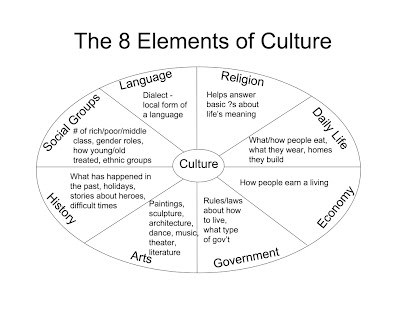
And here is a graphic where someone has analyzed Japanese culture through this lens:
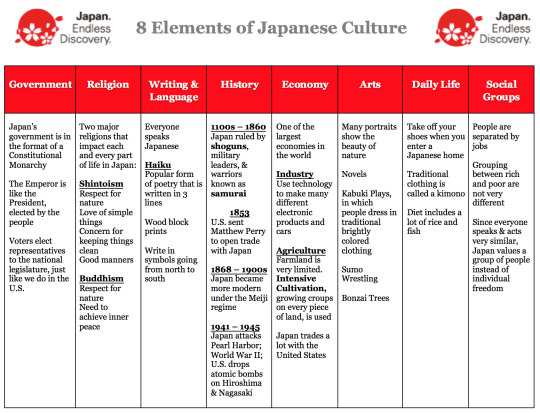
Most cultures share elements of commonality. You can use this graphic above to figure out how to research. For example, the culture of Joseon Korea as I have tried to research for this fic comprises of:
1) Language (written and spoken - so Korean; Hangul, + Chinese characters);
2) Religion (shamanism + neo-confucianism)
3) Government (caste system + agrarian bureaucracy + royalty) etc.
You can fill in the blanks this way for any time period and thus get a better understanding of the culture you’re writing about.
Additionally, I’ve spoken about the cultural iceberg on twitter before, but I find it very useful when I’m researching to pick up on each element in it and look up information pertaining to them.
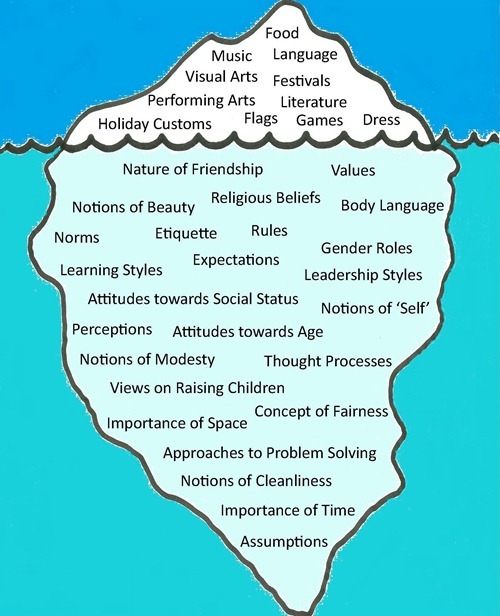
This is how I use the iceberg:
> the top portion is usually the things that we’ve picked up on, through Run episodes or general Bangtan stuff. Like, we know hanbok is Korean traditional dress. We know the kind of food they eat. We know the music scene in SK, and that the major festivals are seollal and choseok.
> the bottom portion is where you gain deeper intercultural understanding. Notions of modesty, for example. We know that gender roles in Korea are more entrenched than they are in the west. In this fic, men are the ones mostly occupying spheres of influence, but women have their own spheres—we’ll get to that in a while. If you see, there’s an aspect called ‘nature of friendship’. This is where the concept of hyung-line/maknae-line/same-age friends all fit into this culture. It’s less visible than the top half, but you can still gain knowledge of it. Similarly, ‘attitude towards elders’ or ‘concepts of beauty’ are both aspects of culture. These are keywords you can use to learn more about culture. Again, you can also use this in original writing projects to build your fantasy world. I know I do :)
Now that I know how my characters live, I come to the second stage of planning/world-building:
2) where in society are my characters: since I’m writing a mystery, I need someone who wants to solve it. I need detectives. I read up on everything I could about the Joseon lawmaking process, going through scholars and bureaucrats and ministers before I found a smaller, quieter force: the podocheong. I also need medics, people in charge of administration, senior officials, and so forth. For each of this, I tried to look into how my character could have entered that role, what that role comprises of, and where it puts them in that society. Seokjin, because he is a senior official, would require to have taken a test to enter into that force. His family would have to be of a particular class status to even enable him to take it. Knowing this, I looked up everything I could about the gwageo because I found it so fascinating! There were whole coaching centers dedicated to just teaching children of upper-class bureaucrats so they could pass the gwageo! If you belonged to an upper-class yangban family, and you didn’t pass the gwageo for four generations, your titles could be stripped from you. This is another nugget of information that I thought would be an interesting premise for a character being a in a particular conundrum—you’ll see that later in the story.
For Taehyung, being an artist in that age would have come with interesting baggage. Calligraphers and painters were usually higher-class folk. Peasants simply did not have the time or the materials to pursue art. But there are outliers—inkstick craftsmen, for example, are among what was considered the ‘vulgar common caste’ but they were the ones who made ink and color pigments.
This just helps me create a richer world than I would have without putting in this research. It also makes your world seem more cohesive, lived-in, and deep.
So now that I know how they live and who they are, we come to:
3) what are my external/internal conflicts: my characters behave the way they do because of the culture and the customs of the time period. My external conflict—the murders—have to be set against a background of this, and informed by this. So I chose to make Yoongi a sort of disgraced scholar because it allows him to operate outside of his station: he needs to talk to Taehyung, or villagers for example who are all beneath his station, and he wouldn’t be able to do that to the same effect if he is a regular scholar like Jin is. The culture simply won’t allow him to. That also leads to friction between yoonjin, and secrets once they start appearing. His current station helps him integrate better into Tae’s world, while removing him from the world he’s working for. It also serves for his internal conflict, fears and grief.
Now if I were to extend this example to a more contemporary story: say your characters are in modern Seoul. Your external/internal conflicts can still be tied into the culture. Expectation on children to look after their aging parents OR the character’s family values vs. individual outlook OR Korea’s culture of students studying late into the night vs. the slowing job industry etc. For a Jinkook fake-dating AU, say, consider what are the troubles that Jin and Jungkook, who have 5 years between them, individually face. 27 year old Jin’s place in society, social spheres and worries will be very different from just-out-of-college Jungkook’s.
Why does any of this matter?
I just think putting in some effort to understand culture makes for richer characters, a richer world, and better writing. Not to mention it lets you learn about a new culture, which I think is fascinating, especially if you spend so much of your time thinking/talking about 7 Korean boys.
So to summarize— I guess this is how I research/worldbuild:
1) Find out when and where
2) Find out who, and how that character is affected by the customs/culture of that era/setting
3) tie my external/internal conflicts back to the era/setting so that the world feels truly lived in and alive.
For truly good world-building, make sure that your conflicts are caused by limitations imposed on a character due to their cultural setting, or because whatever is happening is outside of their comfort zone. Human beings don’t live in a vacuum. The society and the values that we grow up in affects everything we do, every decision we make. Even rebelling against that culture is an aspect influenced by that culture. Your world (fantasy or otherwise) will feel way less flat if it follows the rules of actual cultures world over.
*mic-drop*
If you found this post useful as a resource for writing/world-building, please consider a small ko-fi donation!
[PS: Clarifying that I will not be taking ko-fi for the fic itself - only for the original content that I provide here, on this blog, which can be used for fanfiction or original world-building.]
75 notes
·
View notes
Text
chivalry is dead (4)
A/N: also can be titled “roman #1 get so valid that BS almost started crying while writing this” — roman gets valid and things are about to speed the h e c k up!!!!
WARNINGS: Sympathetic Deceit, cursing, panic, yelling/arguing (things get Bad before they get Good), crying, self-hatred, self-deprecation, more mentions of being touch-starved (im returning to the story’s original idea YEET) — let me know if i missed anything!!! also i realize i stopped tagging sympathetic deceit? so im gonna go back and.,,.. fix that., ., . ., . .
Words: 3796
Pairings: in this one? Roman gets valid and loved, but nothing overt yet
Part 1 (chivalry is dead) — Part 2 (i’m wishing) — Part 3 (the bells of notre dame) — Part 4 (honor to us all)
AO3 link!
@starlightvirgil @forrestwyrm @daflangstlairde @marshmallow-the-panda @askthesnake @k9cat
enjoy!! <3 <3
“The….Playwright,” Deceit recoiled, nose scrunching up as the name rolled off his tongue. He didn’t like the confusion, of course, but he especially didn’t like how Roman was being honest about his name. “I think I speak for all of us when I say that we don’t want to deal with your dramatics right now, Roman.”
“What’s the purpose of your outfit change?” Logan took a step closer, and Roman took a step back from Logan’s accusatory tone, “And all of these outfits? And the pseudonym? Where did your room go? Why have you been hiding for a week? What—”
“That’s all backstory, I can’t help you there. It’s not very fun to focus on,” Roman — the Playwright? — walked around the group, towards the table, “Roman and the Imagination are in a very important discussion, and you all interrupted us at the first climax.”
He leaned on the table, ignoring everyone by looking through some papers, mumbling to himself. It was unnerving. The energy of how the Playwright carried himself, just from seeing him, was distinctly Roman-like. But not. He seemed more orderly, hands holding the papers delicately, covered in handwriting that wasn’t nearly as loopy or rushed as Romans’ typically was. It was as though they’d entered an Uncanny Valley.
The group shared looks in a circle, Patton’s eyebrows pinched in worry, Deceit with a tense frown, Logan with an impatiently cocked eyebrow, Virgil and tired snarl. The room’s tension was heavy; it was a miracle that the Playwright was ignoring it.
To Deceit, it seemed that the other three didn’t understand the atmosphere change. “I’m really done with how often you all hide things from each other,” he said, “Look at him. That’s clearly not Roman.”
Patton caught Virgil’s eye. He was staring at the ground, hands shaking at his sides, shoulders hunched to make himself seem smaller. Patton extending a hand towards him, but Virgil pulled away. He marched away from the group and towards the Playwright, ignoring Patton’s hushed warning “Virgil!” and grabbing the Playwright by his sleeve with both his hands.
He spun him around to face him, holding the Playwright tight but trembling horribly.
“I don’t know what you and the Imagination’re on about, but you’ve been locked in here for a week and you got us all worried. And now you’re saying you’re not Roman? You’d better start explaining what the hell you’re doing in here, or we’re dragging you out into the common room,” his voice was deeper, doubled over with his Tempest Tongue, “I’m not fucking with this.”
The Playwright just stared at him, wearing a disgruntled frown. He leaned forward, putting his other hand on Virgil’s chest and pushing him away slow. “If you all paid more attention to the foreshadowing, then you would have seen this coming,” he said.
“What foreshadowing?!” Logan all but shouted, startling them enough for Virgil to let go of the Playwright’s hand, “You cannot just speak in literary terms and expect everyone to understand you as though this’d been expected. This whole debacle has frankly been too obtrusive to our regular routine. You’ve been unnecessarily tense, causing the rest of US distractions in our work out of worry for you. And with Thomas’ new videos to think of, our production has been placed on a halt because of your gratuitous pity parties—”
“Logan!” Patton yanked him backwards and effectively shutting him up, “That’s enough!”
Logan looked back at Patton, who appeared angrier than ever, and then up at Deceit and Virgil. Both had similarly shocked and fearful expressions. “We know you’re worried, we’re all worried, but you can’t vent your anger out like that,” Patton hissed, out of the Playwright’s earshot.
Clearly the tension’d built up. Logan looked back up at the Playwright. His hands were gripping the table behind him, chest heaving as his breathing quietly picked up. Behind his glasses were tears growing in his eyes, face contorted into a hurt and disgusted unhinged-jaw scowl. What an outburst. Logan leaned back, withdrawing his hand from where he had been angrily pointing a finger just seconds before.
Immediately, he knew he had to apologize. “I...Roman, I—”
“No development,” the Playwright was venomously angry, “No-No awareness. From any of you. I already said I’m not Roman. Not….”
His voice cracked and he looked away. “Not all of him, anyway,” he turned back around, facing the table, shoulders hunched over.
Patton pulled Logan back, letting him quietly stand with Deceit and Virgil. He approached the Playwright slowly and put a hand on his shoulder. “Playwright, right?”
The Playwright swatted Patton’s hand away. “Don’t touch me,” he hissed.
Patton’s brows pinched again, and the Playwright continued in a softer voice, “It-it feels weird. Sorry.”
Alright. Alright, that was okay. Patton leaned on the table besides him. “That’s okay. I’m sorry we interrupted you. Really. But we’re all really worried about you, and we miss you a lot, all of us. We didn’t know what was best to do, since you don’t like being interrupted, but we couldn’t just leave you alone. And, if there’s something we can do to help, we’d like to. We just wanna understand what’s going on.”
The Playwright looked up at him with a single eyebrow raised and fresh tear-tracks down his cheeks. It didn’t look like he was bought what Patton was selling.
Patton took a deep breath and kept going. “I’m sorry we didn’t check on you sooner. But we, um. We wanna help you finish, uh. Writing the story. Or play. You’re a Playwright,” he was rambling now, wasn’t he? He should wrap it up. “We just care about you, a lot.”
He searched Patton’s face for fault and, finding none, turned back to the group. Logan’s fists were balled as he stared hard at the carpet, and Virgil and Deceit were standing besides each other, both watching the Playwright with set jaws. Virgil gave a tiny nod. Yeah, they did care, and they sure as hell weren’t leaving without answers.
The Playwright looked at Patton again. “It’s alright, right, Playwright?” Patton asked, voice soft with a puckish edge.
His response was to snort quietly and punch Patton’s shoulder gently. “I appreciate the wordplay.”
Patton giggled. The Playwright chuckled, too, and wiped his face with the butt of his palm. “I’m sorry, you all,” he said, “I’m, um. This whole situation has been a headache and a half, incredibly stressful, so I must report that my emotional state is rather volatile.”
He cleared his throat, fixing his tie and vest, without looking at the group yet. “We–I–All of us didn’t think you’d care enough to be involved, but now it’s a little late for big changes. Thank you for checking, though.”
Again, nothing hidden. Deceit cast a sidelong look at Virgil. Virgil was fiddling with his zipper while watching the Playwright, tugging it open and zipping it shut. He seemed to be calming down himself as the but the lingering questions of what the heck was happening definitely weighed in everyone’s minds enough to keep him on edge. Deceit glanced at Logan, who was watching Patton with a blank look, before deciding to ask himself.
“So. Playwright,” he stepped closer, one careful step at a time, ignoring how the Playwright was refusing to look at him, “What’s happening? Care to explain?”
The Playwright just gazed around at Logan, Patton, Virgil, then Logan again before answering. “I’m sure you’re all wondering that. Sit, I guess. I’ll provide some exposition, for a change.”
He waved a hand, conjuring couches behind them. Slowly, each Side sat, though everyone leaned forward to an extent. The Playwright sat on a stool in front of them, cradling some papers he’d pulled from the table.
“Roman — the Roman you know, the Prince — had an epiphany. I believe he mentioned it on camera, actually, during the Sander Sides episode ‘Crofters: the Musical,’” the Playwright squinted at one of the papers. “‘I can’t help but wonder if we as a society are past the days of celebrating dashing princes and acts of bravery that are edging on stupidity,’ at timestamp 4:36.
“Despite the acknowledgement that there would be no heavy character development in that episode, that line stuck with him. Princes simply aren’t appreciated anymore, by the audience nor by you all. Thus, to continue maintaining a desired presence, Roman tried to imagine a new form that would be….wanted. But we came up with multiple possible forms. After all,” the Playwright sighed, flipping a page, “Anything is better than the Prince.”
That sat uncomfortably with everyone, though it was difficult to pinpoint why. “I, uh, kiddo?” Patton raised a hand slowly, but the Playwright waved his papers at him.
“Don’t interrupt! Anyway,” he adjusted his glasses, “Back to the source material, Logan is my point of comparison. Hence,” he indicated to himself, “Exhibit A. But I wasn’t the only ‘form’ produced, for lack of a better word. Because there were so many forms — seven, to be precise — we have been hosting a small battle-royale in the Prince’s favored setting. The other six are integrated into Prince Roman’s kingdom village. My themeing is less tied to a narrative and therefore I am backstage.”
“The Mind Palace’s considered backstage?” Deceit jerked his thumb backwards, at the hall of costumes.
The Playwright only glared at him over his glasses. He cleared his throat, looking over Logan and Virgil as though daring them to interrupt, before continuing through his notes.
“All of us theoretically have the common goal of capturing the others and killing them, in the hopes of replacing the late Prince—”
“Hang on, hang on,” Virgil put his hands up, “‘Late’? Roman’s dead?!”
The Playwright rolled his eyes. “Clearly not,” he said, earning an exasperated glare from Virgil, “Roman has simply been dissolved into seven facets, each displaying different characteristics that he possessed. The same could be done to all of you but, well, enacting it in the actual Mindscape without the help of an imagined scenario would likely be painful. Example given, we could probably divide you into impulse, self-deprecation, overthinking, et cetera. Though I can’t declare myself an expert on the Mindscape’s lore, so don’t quote me on that.”
“Thanks for the fucking call out,” Virgil grumbled, pulling his hood up and yanking the strings down.
The Playwright’s brow pinched, not understanding what he’d done wrong. He turned to the other three Sides, lip pursed, and motioned for the conversation to continue.
“So, and correct me if I’m misunderstanding,” Logan said, “But you are one of the seven forms that the Imagination created?”
“Indeed. Like I said prior, I’m the Playwright. The things I represent are more in-line with the creative features of Creativity, though I must admit a little bit of egoism and dramatic flare are definitely written into my character,” he flipped to the last page of his notes, “Much of my inspiration was drawn from you, as I implied earlier. And, to be frank, my goal is simply to maintain order while the other aspects of Roman deal with whatever they believe is correct.”
“I understand. I do enjoy the necktie,” Deceit rolled his eyes at Logan’s self-flattery, sharing a tired look with Virgil. “Focusing on something else, does that mean the other six forms bear different resemblances to Roman as well?”
“Of course. One of the only commonalities I’ve noticed thus far is everyone’s affinity for Disney, but that can be attributed to Roman falling back on a strong creative inspiration base, thus dividing Roman’s representation across multiple character tropes to find one suitable.”
“I don’t—okay, I’m not following,” Patton raised a hand again, “You’re using Roman’s name kinda….without talking about him as a person.”
The Playwright smiled thinly, fingers drumming against his papers. “Yes. I’m discussing ‘Roman’ more as a concept than an individual. Consider it as though myself and the other six are presently different pieces of the whole ‘Roman.’”
“Yet the Roman we know, the Prince as you call him,” Logan felt Virgil squeeze his arm, “He is somewhere in the Imagination. In whatever projected battle you have all created or not, but he still exists.”
“Well, like I said, I cannot declare myself an expert over the Mindscape. We may be able to create and bend reality here, but there are even things that we don’t know,” the Playwright pulled the pen from his hair and scribbled something onto his notes, “That is an interesting point to research, though. I can think of one form that bears a striking resemblance to the Prince, but if they were the Prince before, they certainly aren’t now. Should the Prince be somewhere in the world, we might be able to erase him finally, because I don’t think—”
“Erase? No, no, we need him back,” Virgil stood up at the same time as Deceit, who said “We’re here to GET Roman back.”
The Playwright blinked up at them, pen still pressed hard against his notes. He looked at Patton and Logan, still sitting, and saw them just as shocked. Maybe a little distrusting. He hadn’t been gifted with a sense of emotional atmosphere, so he didn’t fully understand everyone’s reactions to the news he deposited.
“.....Why?” he turned back to Virgil, setting his notes back on the table behind him, “Any of our other forms are more prefered. The fans don’t enjoy the Prince, none of you like the Prince. It could be argued that you just don’t like Roman, but, well. I don’t—”
“We love him!” Patton stood up now. “Roman — the Prince, he’s one of our best friends! And the Imagination can’t just take him away!”
“Yeah, now — yeah. Yeah, no, we need Roman back. I don’t like this whole,” Virgil stood up, too, gesturing to the Playwright, “Roleplay stuff. Give us back our idiot Prince and we’ll get outta here.”
Logan cut in, though stayed sitting. “As much as I’ve enjoyed our discussion here, Playwright, I’m inclined to agree with Patton and Virgil. We would prefer to have the Prince back.”
Deceit just squinted at the Playwright. He was trying to dissect the battle royale situation that’d been described.
“Like I said. He is gone. I don’t know where, I don’t know where the Imagination brought his being or what form he’s taken, but he’s not here,” the Playwright put his hands up, sliding the pen back behind his ear as he did so. “Why are you all so attached to the Prince? Hasn’t he failed you all enough?”
What was the purpose of the battle royale? What were the possible implications?
“Well, we’ve all failed each other a bunch, haven’t we? We want Roman here, flaws and all,” Patton said.
“But the less flaws Roman has, the more desirable he becomes. He’s annoying, not smart, not practical, quick-tempered, loud, dramatic—”
The Playwright understood what they were saying, Deceit realized. He just didn’t understand the why.
“You don’t need to list his flaws, we know. But despite that, Roman is also intelligent, ingenuitive, pensive, reflective, and,” Logan drew in a breath, voice steadying. “And is loved.”
“Well, that’s a great sentiment, but you can’t mean it. That’s—”
“He is ridiculous at times, but he does his best,” Deceit finally stood as well. “You’re unable to weigh his virtues.”
“Oh, he’s got virtues now?” the Playwright’s voice grew shrill. “No one’s demonstrated that line of thinking!”
“Yes, of course he does. He is thoughtful, spontaneous,” Logan was counting on his hand, “Kind, endearing, chivalrous—”
“Haven’t you heard? Chivalry is dead!” the Playwright’s voice increased, suddenly screaming. “No one wants the stupid, annoying, needy Prince Roman! You don’t want ME!”
His back immediately straightened, hands shooting to his mouth as his words echoed around the darkened costume room.
Everyone froze as well, staring at him with incredulity. The Playwright leaned back onto the table and looked down, hands still gripping his mouth.
Silence fell as a blanket over the group, dampening the growing tension with an uneasy reality, as the four Sides looked between each other. Virgil opened his mouth, but Logan held up a hand, opened his, and then Patton held up a hand and made a shushing sound. Virgil put his hand over Patton’s, an eyebrow raised.
Deceit wished he understood what the hell they were all saying to each other, with their eyebrow raising and quiet gestures. Maybe it came with them being so intertwined within the Mind Palace. Wow, Deceit, focus on the task at hand before you think of your own solitude.
He cleared his throat, and the other three glanced up. “Of course we want you, Roman,” Deceit’s voice was quiet, gentle even.
“You….I guess that’s an interesting plot twist, if you all truly want him back,” the Playwright whispered into his hands, rubbing them together in front of his mouth, “But you’ll have to convince him. Roman, not….not just the Prince form.”
“Convince you?” Deceit whispered.
The Playwright shook his head. “Him. Roman. All seven of us. And–And not all of us are friendly or docile. And not all of us are forthright, or understood, or easily interpreted.”
Truly an endeavor, if they couldn’t even get into the imaginary kingdom. Deceit stepped back, pursing his lips. He looked back at the rest of the group and, for once, they were all on the same page. “Alright, then.”
Virgil approached the Playwright first. His hands were balled at his sides but he seemed more level-headed than before. “Hey,” he said, leaning on the table besides the Playwright, “If it’s for Roman? Sign me up.”
“Me, too,” Patton said, determination lacing through his voice. He leaned on the other side of the table, meeting the Playwright’s skeptical eyes with a small shrug. “We need him.”
“As much as I am confounded by the Imagination, I agree that we need Prince Roman back. His absence leaves much to be desired,” Logan stood in front of the Playwright, arms resting behind his back.
The Playwright watched Deceit, eyes wide behind his glasses. He slowly gazed over each of the Sides, once again stopping on Deceit, who simply nodded.
This was real.
He sniffed, and he laughed, lifting his glasses again to wipe his eyes. “That was so cliche,” he murmured, “And you’re all fucking saps. You’ve….well, I can’t say I’m difficult to handle, compared to everyone else. I’ll help you into the Imagination and see what I can do to help you find the other forms, but that’s all the deus ex machina I can perform.”
“You’re wonderful, Playwright,” Logan smiled at him, and the Playwright chuckled quietly.
“Rich, coming from you.”
“Um,” the Playwright turned to Patton, whose arms were open. “Can I? I know you said it felt weird, but, uh, I know Roman likes hugs when he’s feeling down, and I like hugs a lot, too.”
The Playwright blinked once, slowly, before leaning into the hold. Patton’s arms wrapped tight around his shoulders.
It felt.
Heavier than a cloud.
He shivered, snuggling his body more into the hold. His hands grasped at the back of Patton’s polo, tugging him closer, if possible. The staticy and burning feeling of Patton’s arms pressing against him was more bearable than he’d thought it’d be. It was nice. Grounding, even, for a desperate piece.
“Thank you, Patton,” the Playwright mumbled into his chest.
Patton laughed, squeezing him again. “Any time, kiddo.”
Left unattended, the Playwright probably could have stood there for hours. The lights in the room, ominously glowing from no direct source, seemed to glow brighter. With a sniff, though, the Playwright leaned back and rubbed his face, then clapped.
“Alright! First, you all need to look through some of those,” he gestured to the left wall of costumes, “Because I refuse letting you go out and ruining the setting. Period dress only.”
“And it’ll give me some time to write in a mechanism for you to find the other forms,” he moved back over to the table, shuffling through his papers with an increased fervor as the other four sides followed. “Perhaps even the Prince, I don’t know. I don’t know what’s happened to him.”
“Period clothing? Doesn’t this count?” Deceit gestured to himself, “Don’t I look period enough?”
The Playwright stopped and shot him a deadpan look. “No. That hat, in a medieval fantasy setting? The cape, maybe, but you can definitely find something more….functional,” His lip cocked up just a little when Deceit let out a dramatically offended gasp, “Go look, I’m sure there are some hats that’ll fit your fancy.”
Deceit turned back around, grumbling to himself but following the other three Sides in flitting through the clothes. As they found outfits that they enjoyed, they brought them to the Playwright, who conjured them into new colors and perfect tailoring without much comment on the outfits. All the while, he was to be scribbling something in a book, black ink flowing from the golden pen, muttering quietly to himself when the others weren’t near. After what seemed like hours, trying on outfits, discussing presentation with the Playwright, the four sat on the couch.
Ready, supposedly, for what was to come. The concern and nervousness of earlier had mixed together, with a new spark of understanding and determination. They were going to get Roman back.
The lights grew brighter.
The Playwright approached them, holding the book in his crossed arms. It looked like a simple leather-bound book, but the front was adorned with a pressing of the same ribbon-esque decal that was on the back of the Playwright’s vest. “This should help,” he said, holding the book out to the trio, “It….As you win over the other forms, the cover will update, and the inside will update with more about them and the world.”
Logan took the book and flipped it open. Sure enough, most of the pages were blank, but the first had a “Table of Contents” with one entry available: “the Playwright.”
“Thank you, Playwright,” Patton said, reaching up and taking his hands, “I’m sure we’re gonna do great! After all, I can’t imagine what’d go wrong.”
Deceit groaned, and Virgil snickered. The Playwright just smiled a tiny bit more.
“I couldn’t dream of anything happening,” Deceit shot back, and Patton laughed.
The Playwright felt a twinge of something, in his chest. Something he couldn’t identify. Maybe another form would figure it out.
“I wish you all the best of luck,” he said.
“Wait,” Logan looked up from the book, “Are you coming with us?”
The Playwright’s smile widened.
“Uh, Playwright?”
He lifted a hand and snapped his fingers.
The couch and the ground beneath them all disappeared. They all let out shouts and screams as they fell through the floor, into the pit, watching the Playwright and the costume room fade upwards into the distance.
#roman#ts roman#roman sanders#virgil#ts virgil#virgil sanders#deceit#ts deceit#deceit sanders#logan#ts logan#logan sanders#patton#ts patton#patton sanders#fic#my fic#thomas sanders#sander sides#ts fanfic#i realize i have no idea if i should be tagging this as sympathetic deceit#should i ???#sympathetic deceit#i guess? ? ? ? ? like#hm should it go earlier?#im so excited y'all im introducing like 3 more romans in the next chapter#they're all wonderful
95 notes
·
View notes